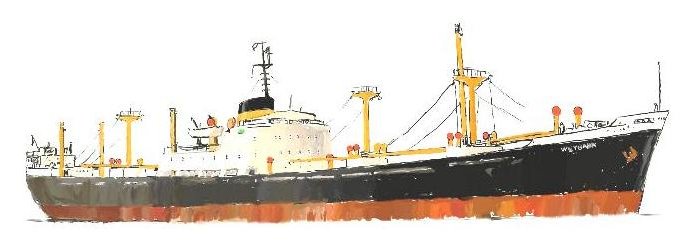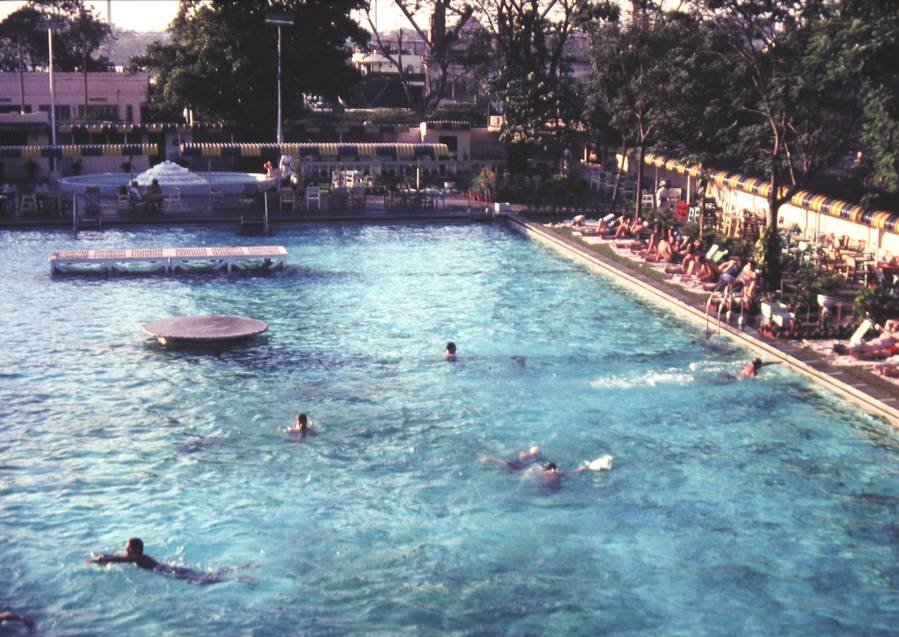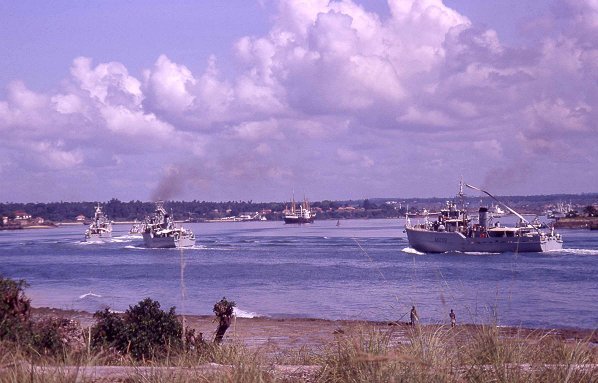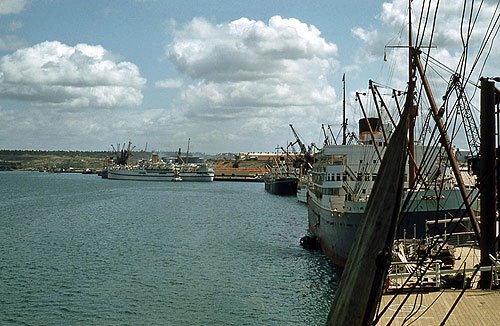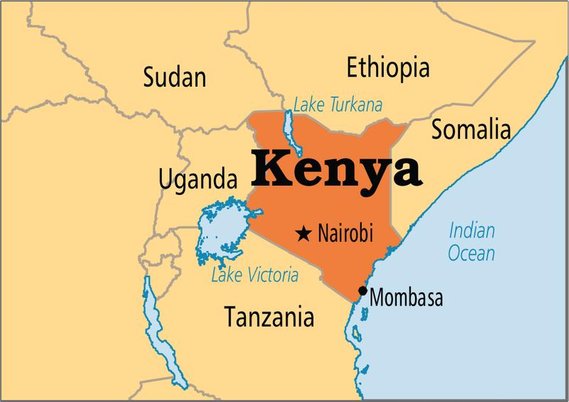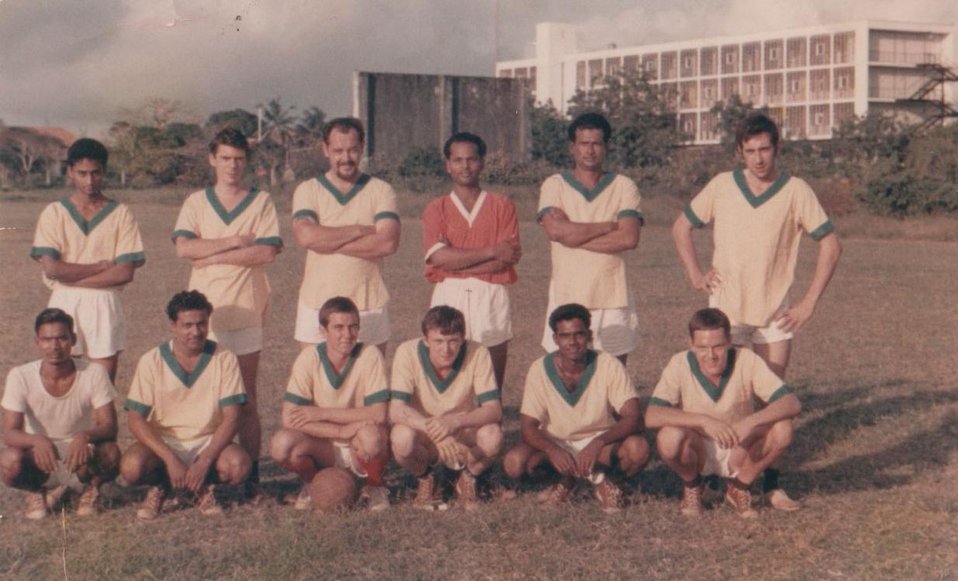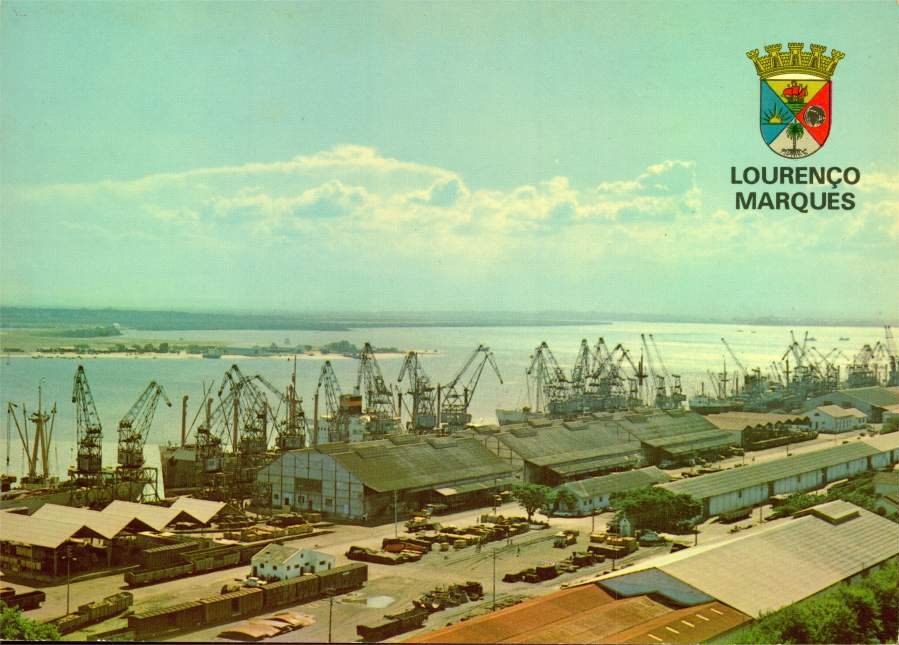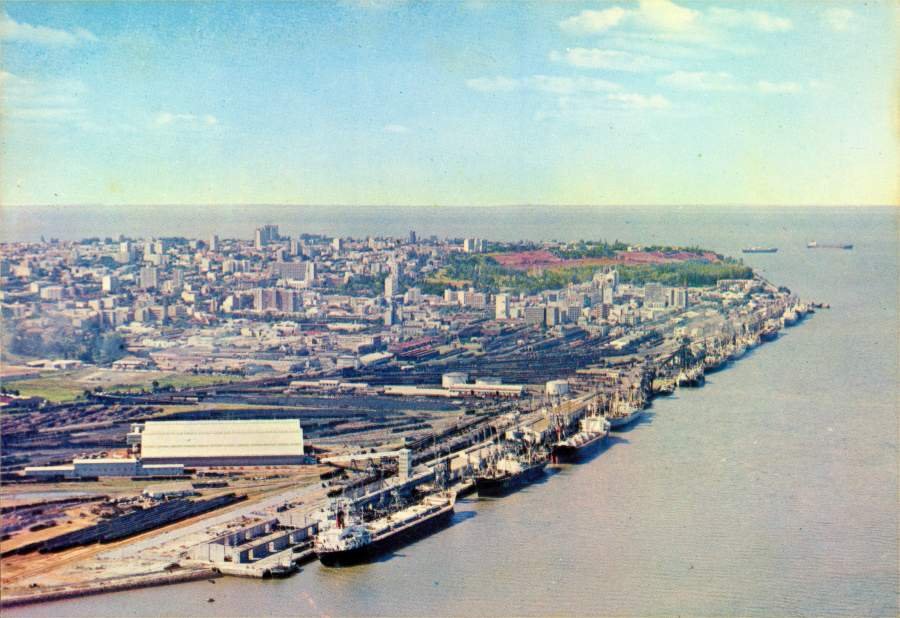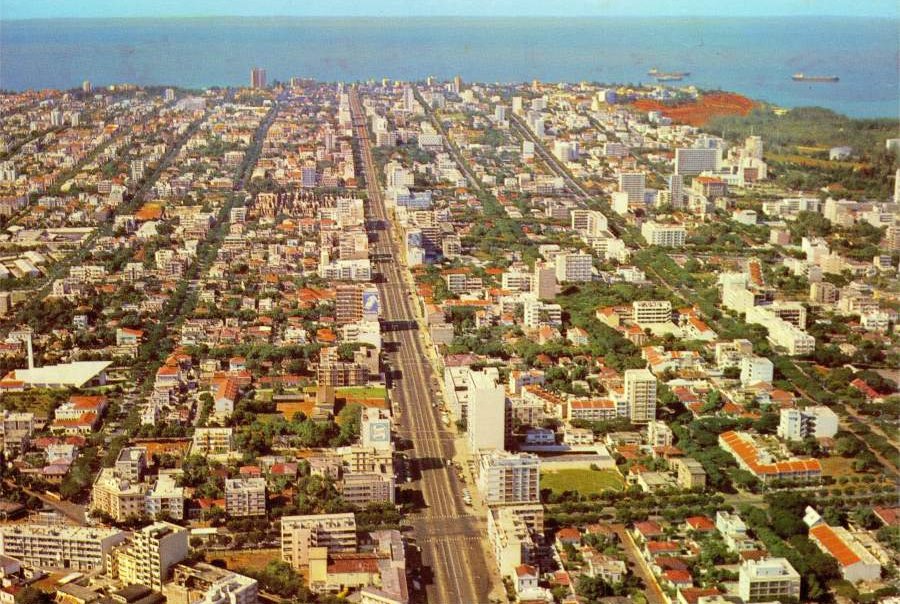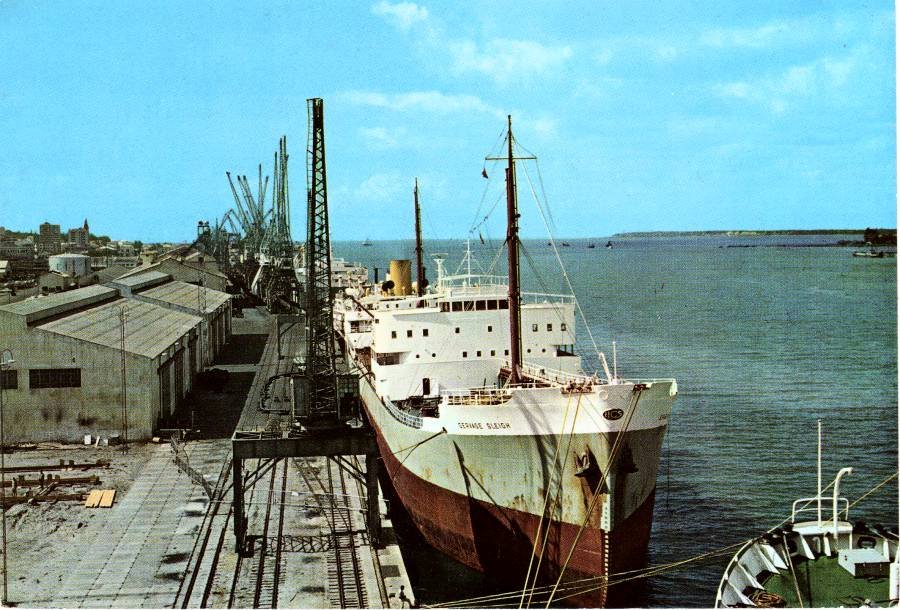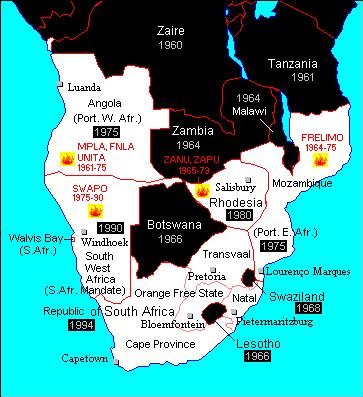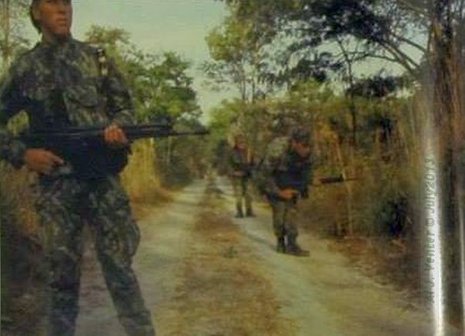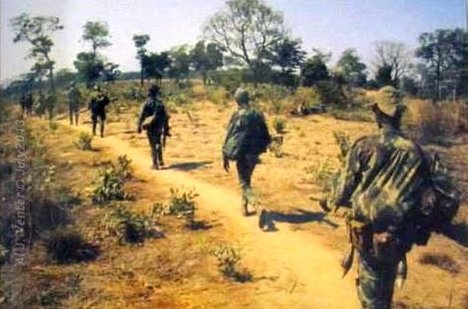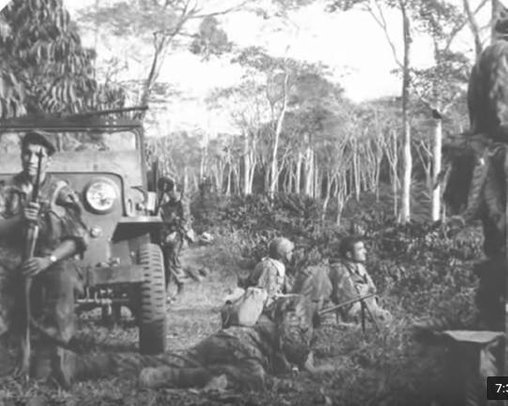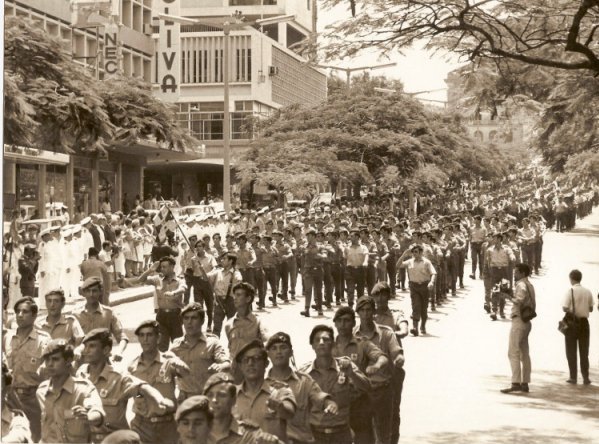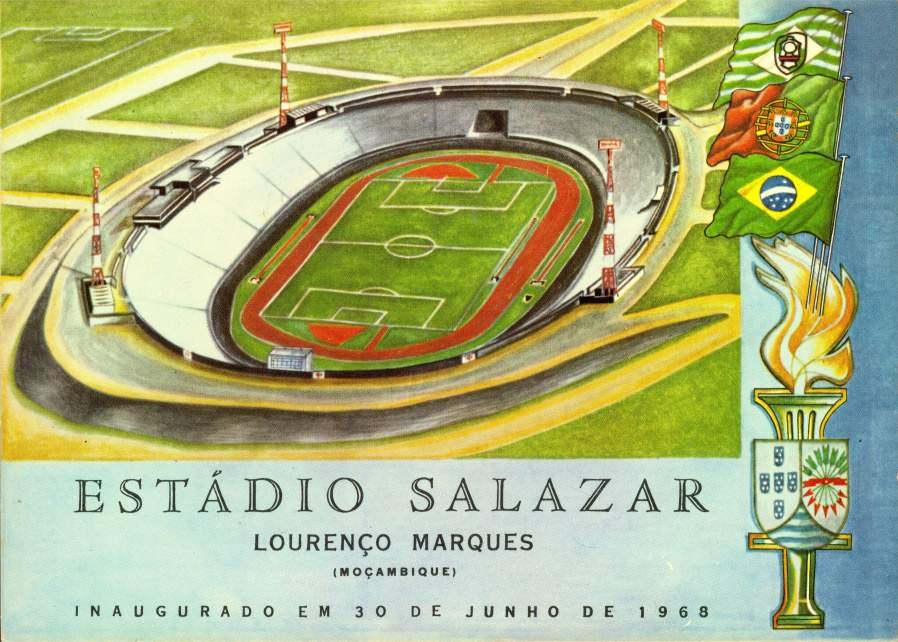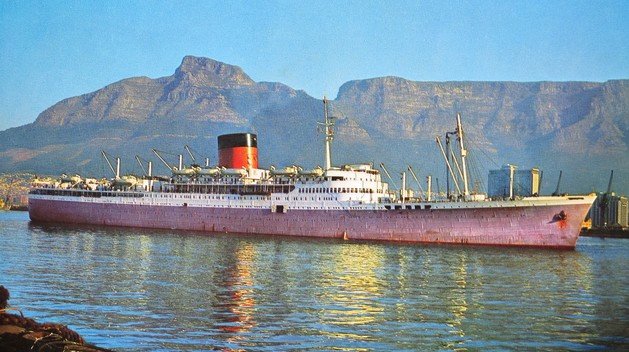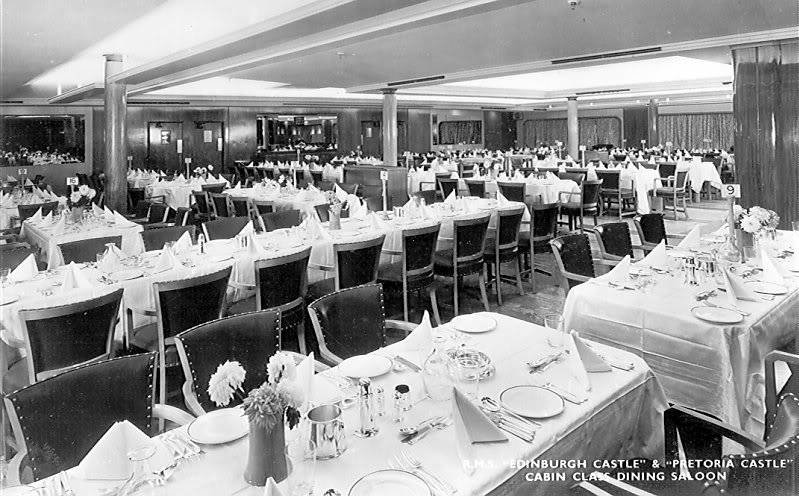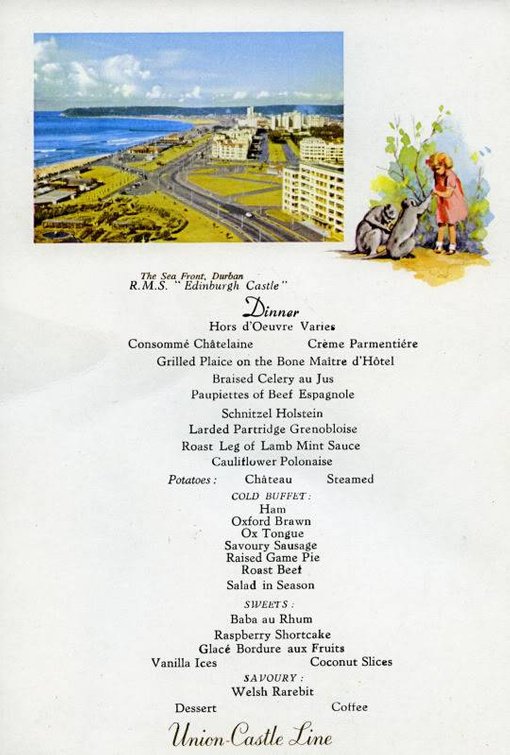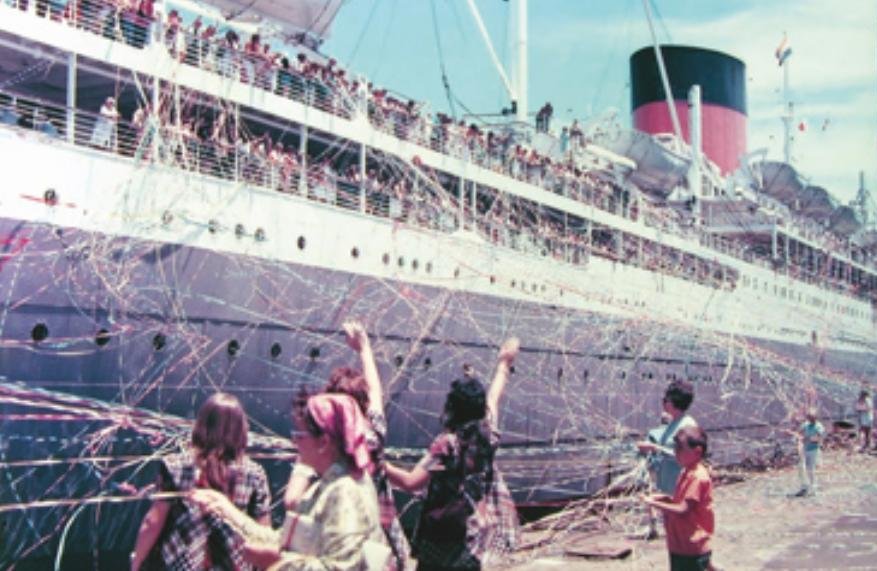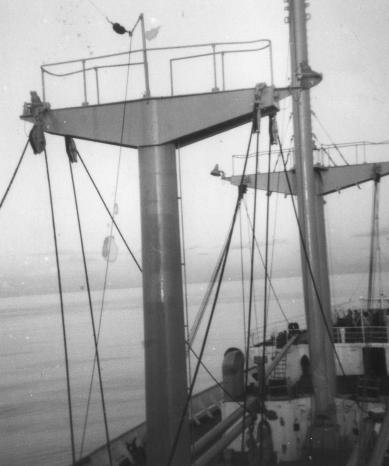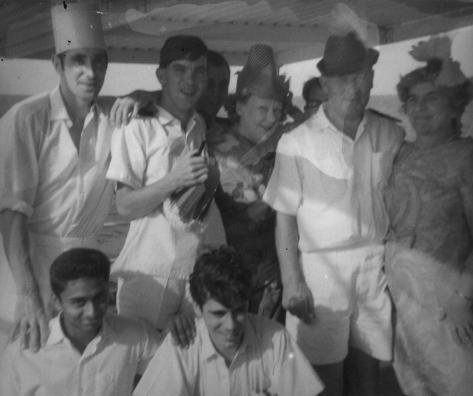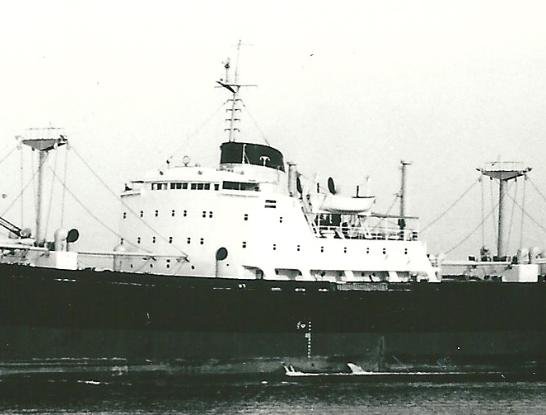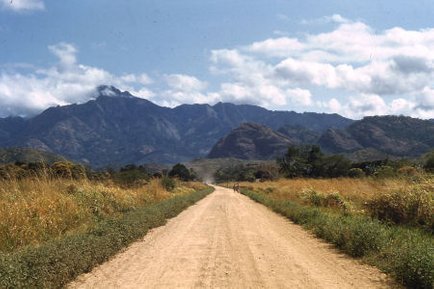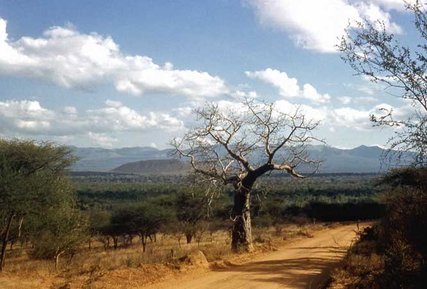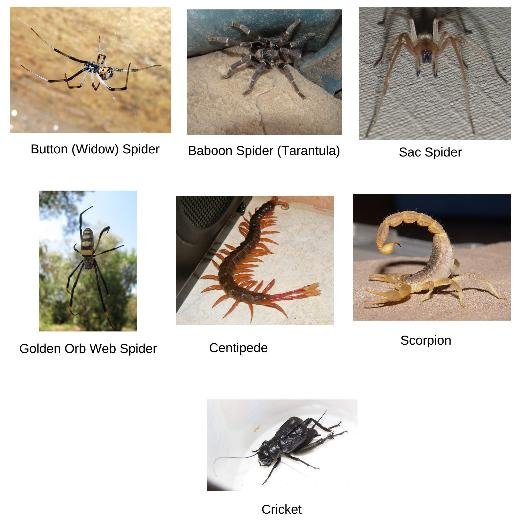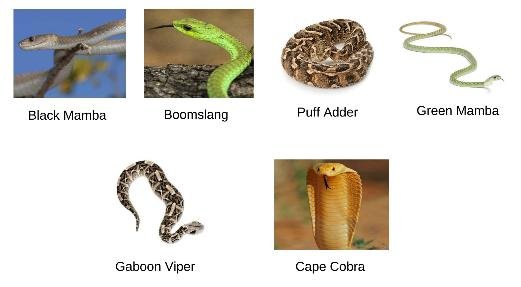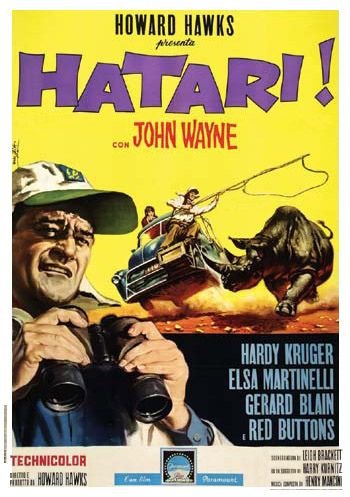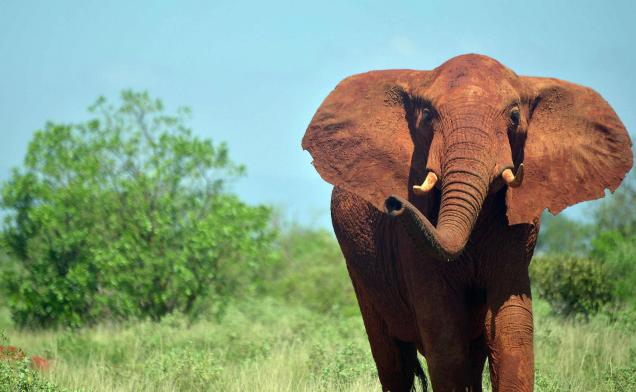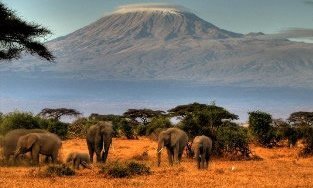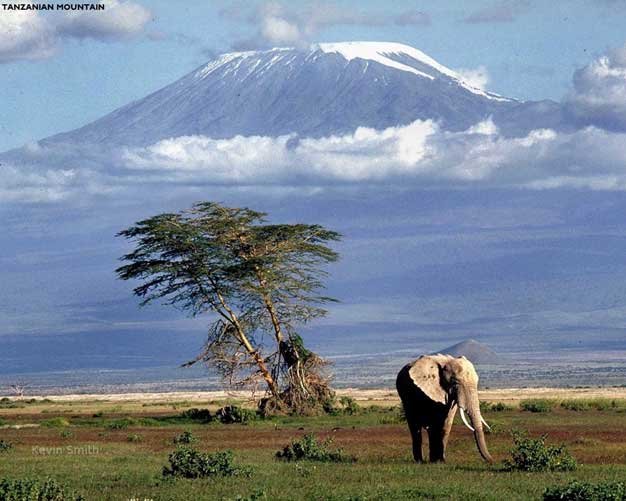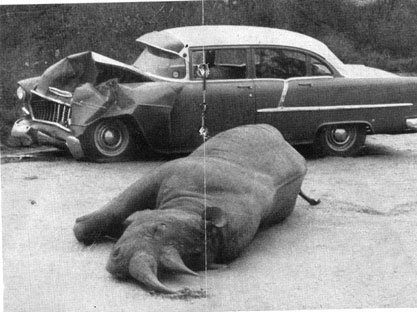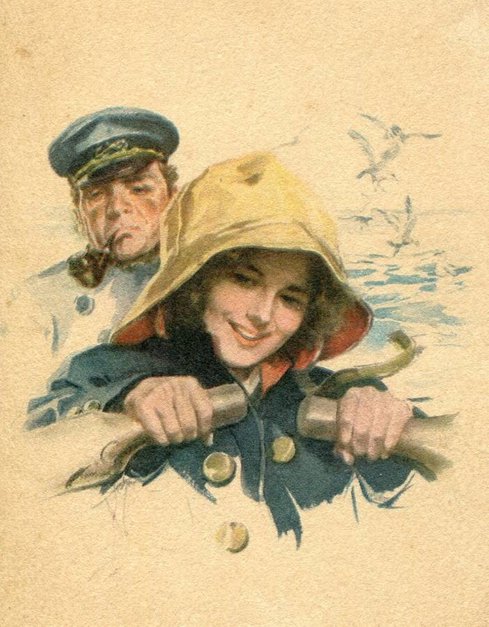Mandalay
M.V. Weybank - Chapter 4
For the next twelve months, Calcutta will become our proxi home port. From Calcutta we will sail down the east coast of India, across
the Arabian Sea to the east coast of Africa and all the way down the east coast to Capetown, loading and discharging cargo at many ports of various countries along the way. From Capetown we reverse direction and more or less follow our footsteps, again calling at
as many ports on the way back until finally we again arrive at Calcutta where we change the crew (not unfortunately the officers!)
We will make this round trip three times before we finally depart from India/Africa and head to the Far East.
As I unfortunately did not keep a diary, I cannot recall the sequence of events but I can recall many of the events themselves. Also because we visited some of the same ports up to six times during the coming year, I cannot remember the "when". Therefore I will just write about my memories of the ports, not neccessarily in the sequence of calling at them.
The main ports of call which I remember (there were lesser ones which I can't) are listed below more or less in sequence from Calcutta down to Capetown:
Calcutta
Madras
Daaka
Chittagong
Colombo
Cochin
Mogadishu
Mombasa
Tanga
Zanzibar
Dar Es Salaam
Pemba
Madagaskar - Two ports of call.
Beira
Laurenco Marques (now Maputo)
Durban
East London
Port Elizabeth
Capetown
Calcutta
I will write about Calcutta a number of times but the following account remains most vivid in my memory so I will start with it.
At that time 1968/69, the Indian government was cosying up to the Russians (as opposed to the West) making a lot of trade agreements etc. with them. Amongst these were arms sales - aircraft, tanks, missiles etc. and also foodstuffs like grain and so on.
The magnitude of these sales was apparent from the number of Russian ships at any one time alongside in Indian ports.
Although these ships were classed as merchant navy vessels - there was really no such thing in the USSR as all of these vessels
were in reality grouped as a kind of Russian Navy Fleet Auxilliary. Many were built to purpose allowing for rapid conversion in time of war to troop/tank/tanker transports and had been built with streamlined hulls and powerful engines for speed. Many of them were built in Poland or East Germany, paid for in whatever the Russians decided to pay them with (many times with goods neither the Poles nor Germans wanted or needed). In comparison with the standard British, European or US merchant vessel of the time these Russian vessels were much larger - conscription directly to either the Russian army, navy or airforce could be circumvented by Russians if they could get into the Russian "merchant navy". This had many advantages but a few drawbacks, one of them being as far as I can remember having to serve 4 years without leave! (I think the army was 3 years). There was also a "European" fleet the vessels of
which had black funnels and a "rest of the world" fleet which had white funnels. Therefore the crew accomodation of the "rest" fleet
had to be large enough to keep them in relative comfort without going stir-crazy or starting another revolution.
At the time the following incident took place we had already been in Calcutta for two weeks alongside the Kidderpur dock handling cargo. I as the R/O was more or less redundant when in port and could spend my time much as I liked. There were two main reasons for this - one being that by British maritime law the R/O was forbidden from carrying out any other kind of work apart from that pertaining to the radio station. Also aboard the Weybank, the radio station equipment belonged to Marconi and not the shipowner
and like myself was rented out to the shipping company. As the radio department was considered a separate dept. such as the
deck or engine room and I was the sole head of it, I was entitled to eat my meals at the captain's table in the dining saloon and the captain's steward was also my steward. The only one I had to answer to was the captain himself and generally if you did your job
correctly you were left in peace to do it. The other reason for being "out of work" was that by international law it was forbidden to
transmit with either the M/F or H/F transmitters once the vessel had entered the 3-mile limit of a country's territorial waters. Since
we couldn't transmit, we could not reply to land based radio stations that might have had traffic for us and also, since we were
in a port we R/Os did not have to keep our eight hours of watch (2 on, 2 off throughout the day). The rest of the officers and crew
still had to work in port - just their watch periods were changed to mainly supervising loading/discharging cargo which was carried
out by in this case Indian stevedores ( actually semi-slaves would be a better name for them for the pittance they were paid).
The Weybank had air-conditioning which was a godsend in Calcutta where the ambient temperature most of the times when we were there was around 30°C with high humidity. In places like Calcutta I seldom went ashore alone (there is safety in numbers!) and when
I did it was generally in late afternoon/early evening when the temperature would start to drop and also because some of the other
officers then had free time to come along.
It was mid-afternoon one day when I was sitting in the saloon when the 2nd Electrician came running in and said "Hey Sparks, you've got visitors!". When I went down to the gangway I saw two men and a young woman and when I approached them one of the men
asked if I was the R/O and that he wanted to know if I had any movies! I invited them into the saloon out of the heat.
Before continuing, I will explain what he meant when asking about movies and why he asked to see the R/O about them.
There were shipping companies (much more European/Scandinavian/US than British) that showed interest in the wellbeing of their
crews and supplied their ships with such items as washing machines, television sets for in-port use (usually these could be switched
between the PAL European system and the US system) etc. One of the items was on-board movies. There were movie distribution
companies which operated internationally and specialized in supplying ships at sea. The shipping company would buy or rent
projectors and screens for their ships and also rent cases full of movies so that each ship got one (the movies in the cases generally
differed from case to case). The system worked as follows - once at sea there would be a "movie night" maybe once or twice a week
until the crew had seen all the movies in the case. The ship was also supplied by the distributor with a list of ships and their companies (also including those of other shipping companies) who were members of this scheme. When a ship reached the next port of call
it was not hard to find out if any of the listed ships were in port. If so then they would simply exchange the movie cases and both
ships would then have "new" movies for the next trip. Many shipping companies entered this scheme but unfortunately the Bank Line did not - the Bank Line did absolutely nothing for the wellbeing of its crews - Zilch! Nada Zero!
As to why the R/O was sought out: As I explained above, British R/Os were not permitted to do any "side-jobs". This was not the case
with R/Os of European/Scandinavian countries. Aboard most of the Danish, Swedish, Norwegian and German ships the R/Os had two jobs one of course being the R/O and the other being the Ship's Manager ( a few years later when I sailed under German flag I also
did both of these jobs). The Ship Manager was responsible for many things such as making the monthly crew members pay lists,
deducting tax and expenses; running the ship's PX shop selling beer, sprits, soap, perfume, sweets/candies, toothpaste etc. etc. to
the crew members and deducting the costs from their pay. Running the bond locker where all alchohol, perfumes, cigarettes/cigars
were stored en masse; Making crew and passenger lists for the police and customs of each port of call - also in the language of the respective country; posting lists for crew members custom declarations before entering port; filling out crew member shore passes
which they had to hand back to me (and then to the police) before the vessel was allowed to depart; the list goes on and on - but at
least the R/O was paid for both jobs and usually also 10% of all he sold in the PX - there was no time for rest but it was lucrative.
The Ship Manager would also manage the movies!
The Russians were not members of the international movie schemes (for obvious reasons - decadent, immoral, capitalistic propaganda!) but this did not deter Russian crew members from trying their luck ( their favorites were James Bond movies - especially "From Russia with Love"). If we had movies they could either watch them aboard our ship or if they had a projector we would take
the movies with us to their ship and then take them back again after viewing.
Continuing with the story - inside the saloon I offered them a seat on a long sofa which was against the bulkhead and faced by
a long coffee table - I offered them a beer and I sat down on the right-hand side of the sofa, next to me sat (as it turned out soon) the 2nd Mate, to his left sat the Russian woman and to her left the second Russian man. The 2nd Mate spoke excellent English - better than the average Englishman and without any trace of a Russian accent. He had brought along a bottle of Russian (Georgian) cognac
with him and asked if I had a corkscrew. In the interim a few of our own nosey officers had drifted into the saloon ( to ogle the woman)
and one of them said he would try and find a corkscrew. I explained to the Russian 2nd Mate (R2M) that unfortunately we didn't carry any movies so we just continued chatting (for instance telling us that they came from the Russian ship tied up ahead of us). When our
officer returned explaining that he couldn't find a corkscrew the R2M said "OK never mind" then picked up and turned the cognac bottle
over, gave the base a few hard slaps with the palm of his hand causing the cork to start protruding from the neck and then grabbed the
cork between his teeth and pulled it out. The party had started - cognac and beer for all! After a while the R2M turned to me and said
quietly in my ear "you can take the girl to your cabin if you want". He then leant back against the sofa so that I could see the young woman who was looking at me. She couldn't speak a word of English but she knew what was going on. I pretended that I wasn't astounded and like it was a normal offer but declined on the grounds that I was engaged to a woman I loved but thank's anyway.
The R2O didn't press the subject and the conversation continued as if it never had happened.
This young Russian woman was a very attractive slender figured blonde. She was also demure and not in a coy or sleazy way and
the whole time she just sat there with her head slightly bowed staring at the edge of the coffee table. The R2M was not pimping her for money but instead I got the impression that it was meant as something like a souvenir from a friend to remember Russia by and I noted that no one else was offered the chance. I often wondered about what kind of life this girl had to go through - when I had looked into her eyes I felt as if she was saying something like "it's not me doing this".
By about 5.30 pm in the evening the R2O said that they had to unfortunately return to their ship but that they had some movies aboard
and that after the movies they would have a party and invited us to join them. In for a penny, in for a pound so off we went - four or five
Brits plus the Russians back to their ship.
The next thing which surprised me was that there was a Russian sailor keeping watch at the top of the gangway armed with a sub-machine gun slung around his neck. We entered the accomodation superstructure through a steel door which brought us onto an alleyway running alongside the engine-room casing and what happened next really got my undivided attention! Just ahead of us
a steel door on the engine room casing swung open and out stepped a Russian woman dressed in mechanic's overalls with a scarf
around her head. She kicked off her shoes, loosened and dropped her scarf and then unzipped and dropped her overalls on the deck.
She was one of the most beautiful girls that I had ever seen with long blond hair and a perfect figure. Without a glance at us she just
walked stark naked diagonally in front of us down the alleyway and then entered into a shower room. I noticed that this did not appear to have any effect on our three Russian companions - it could have been a Russian "Joe Bloggs" instead of this angel. We were then led up companionways to a higher deck and then ushered into a large room which turned out to be a real cinema with built-in seat rows, a large fixed screen on a bulkhead and built into the opposite bulkhead was a real projector room with slits for the projectors.
Nearly all the seats were already taken by what must have been half of the crew with a few seats left on the second row for us
Brits and our Russian friends. It wasn't long before the lights were dimmed and the movie started. It was a black and white Russian documentary on the Battle for Berlin where the Russians finally raised the Hammer and Sickle over the Reichstag. I noticed during the movie playingthat there was no murmer from the audience - none of the usual distractions in a Western cinema - they all sat almost bolt uprightand stared at the screen. At the end of the movie everyone started clapping so we joined in (instead of being shot). Just when we were getting thirsty having had a few beers and cognacs aboard the Weybank, the cinema lights dimmed and another movie started up. This time it was a colour movie showing all the advances Soviet technology had made - from space, military, housing, agriculture, shipbuilding, automobiles - you name it - it was there to be seen. Again the movie was viewed in complete silence from the audience with the obligatory clapping at the end but this time as soon as the lights went on the audience dissappeared in a flash (freedom at last).
The R2O then took us to his cabin which quickly filled up with other Russians and then the Vodka and Cognac appeared along with
goodies like dried fish which prevents you getting blind drunk if eaten between shots. Out came an accordion and the musik started.
The Russians could really sing and in harmony too and everyone was merry when in walked another officer which caused the music to
stop instantaneously. He was introduced to us by name but not by rank but when he left the R2O told me he was the Politruk or political
officer. A PO maintains party discipline (communist party not the merry party we were having up to this point). He represents the
Politburo and has a very powerful position aboard ship. They approach crew members individually and order them to make secret reports to him on the activities of their shipmates thus no one aboard ship can truly trust their own shipmates. The second function of the cinema is to hold party meetings which all crew members must attend. This is the reason why three Russians came together to the Weybank. The R2O could not come alone and also not with just another companion. Where two might trust each other to jump ship abroad and seek asylum, a third person complicates the equation immensely. Thus with the Troika system, if one man tries to bolt the other two will prevent him. If one does manage then his family and relatives back in Russia will suffer for it and this thus is a further deterent.
As it turned out the R2O and the accordian player were both Ukranians not Russians ethnically. The Politruk had ordered the R2O
to join the main party which was being held in a very large mess room. The lights were dimmed disco-like and the music from a tape recorder filled the room - the vodka flowed and never stopped all night - they told me that they had a vodka distillery aboard the vessel
and I believe them. As soon as a glass was empty it was filled again - I only managed to survive the night by sneakily poring my vodka
into flower pots containing artificial flowers or by poring it on the carpet which could not be easily seen as the lighting was so dim.
There were Russian woman a few who I danced with but none could speak English and I was wary of a honey trap. Sometimes I felt
so drowsy that I would sit back on the carpet with my back against the bulkhead but if noticed was picked up by two Russians and then "trink tovarich!" - yipee!! By this time the sun was coming up and I was determined to return to the Weybank so I went to the R2O and
thanking him said I had to return to my ship to go on watch! He then told me to wait a minute while he dissappeared but returned balancing a pile of books and some other souveniers including a long-playing record of the Red Army choir and parked the lot in my
outstreched arms. I then left by myself navigating down the companionways to the gangway, past a different armed guard and
onto the quayside. I noticed that the books (which were all expensively hard bound) were all about Lenin, Stalin or Marxism so
I held onto them until I came to the Weybank's gangway but instead of boarding I continued until I reached the stern. Then glancing
back to make sure I couldn't be seen from the Russian ship I ditched the books into the water below - I kept the RA record which I still have today.
I was dead to the world and collapsed into oblivion in my bunk. Early afternoon there was a knock on my door and my steward told me that I had visitors, the Chief R/O and two other Russians from the Russian ship!
The vessel above, the комсомолец узбекистана which translates as "Member of the Communist Youth League of Uzbekistan" is
of the same class of vessel as the one which we visited in Calcutta. Apart from the size of the accomodation and speed of the vessel,
note the heavy-lift crane assemblies which would have no trouble lifting tanks for instance in or out of the holds. Another point is
that the ship is not dependent on any harbour crane facilities - or the lack of them to load or discharge such cargoes.
To continue, this time the Chief Radio Officer (CRO) invited me to a tour of his radio station. This amazed me because the Cold War was still in full swing. Not only that but the Russians were almost paranoic about security and this vessel was after all a Russian Navy auxilliary ship (as an example, after I left the MN I worked for a German company in Germany where I often worked aboard
ships in German shipyards. Most shipyards not only built new ships but also had ship repair facilities and I occasionaly saw Russian "merchant navy" ships in dry docks. More often than not the whole bridge area superstructure was covered by tarpaulins to prevent anyone from photographing what was inside).
The first place the CRO took me to was the officers mess (dining room) which was a big room with large rectangular tables. Stewardesses were serving tea but this tea was special! It was ice cold Russian green tea and it was delicious - I can still remember today how it tasted. The stewardess that served our table was an attractive blonde woman with a sweet smile who I guessed must have been in her mid 40's. She refilled my glass a couple of times without asking. She must have known that I had a hangover from the night before although I had not seen her at the party. The tea did the trick and I felt much better. I was sad to leave and not just because of the tea!
Next stop was the radio room which was also a large room. Mounted up on one of the bulkheads was a row of large Russian tape recorders (similar to the big SONY tape decks that were being sold at that time in the west). The CRO told me that these recorders had a variable speed control and were used to record the audio from high-speed morse burst transmissions from stations in Russia. The recordings were then slowed down so that the Russian R/Os could then type outthe morse transmisions with their Russian typewriters.
(Marconi never supplied their cargo ship radio stations with typewriters - if you wanted to use one you had to buy it yourself - and the paper and ribbons).
The next thing was that there were three R/Os busy transmitting and receiving morse. I asked the CRO if he was not worried about transmitting within territorial waters which was forbidden but he just smiled and said "who's going to stop us?" He told me that there were 13 R/Os - himself and 12 others and they kept watch 24 hours a day in shifts of 3 R/Os for 8 hours (just like aboard a large British passenger ship).I asked him what could keep them so busy all the time and he answered that instead of crew members writing home via mail they were entitled to send letter telegrams instead free of charge and also could receive free of charge telegram replies from their dependants in Russia and that a crew member could send such a telegram anytime he liked. Therefore thousands of these could be sent/received per month.(On British ships if a crew member wanted to send a telegram he had to pay for it and the more words a telegram held the higher the cost. The cost of sending a telegram was ridiculuosly high and therefore about the only times a British crew member would send one was to send birthday/anniversary or christmas greetings).
There were also cryptographic cypher machines in the radio room used to cipher/decypher Russian classified traffic (the secret stuff).
Next stop was the bridge where I was shown things like the radar in operation etc. He then showed me a cast-metal box mounted on the chartroom bulkhead.
Aboard a British ship (and just about any other nationalities ships) the deck officers "shot the sun" with their sextants at 12 o'clock noon to determine the ships position. The resultant position in latitude and longtitude was then recorded in the ship's log book but I by law had also to enter the position into my radio log book. The idea behind this was that if a catastrophical distress condition arose where the ship was in imminent danger of sinking - before me sending out an SOS I would not have time to go to the bridge/chartroom (which would be in panic stations anyway) and ask "please could you give me the noon position?". Sending out an SOS without the position or any other information would let anyone receiving it know the callsign but not the position of the ship - only that (during daylight hours) it could be anywhere within a radius of up to 400 or 500 miles from the receiving ship.
What the box on the bulkhead did was it enabled the deck officers to enter the noon position into the box with a keypad. This box was remotely connected to a battery supplied emergency transmitter tuned to the 500 kHz distress frequency. There was a "Start" button on the box and if it was activated this would cause the em. transmitter to be activated and after a short warm-up period would automatically transmit SOS followed by the callsign, the noon position and then long dashes (for direction finder reception).
British ships had a similar box mounted in the radio room called an Automatic Keying Device. However, to use the AKD the emergency transmitter had to first be switched-on manualy and after warm-up manualy tuned to the distress frequency. The AKD then had to be switched to connect to the transmitter before its "start" button could be pressed. The AKD would transmit first an alarm signal sequence to activate any receiving auto-alarms (see Chapter 1) and then the SOS signal but without any position information! The position could only be transmitted if the R/O had time to manualy transmit an SOS together with the position.
To give tragic examples - when I later worked ashore in Emden, Germany I often was called to service vessels serving as automobile transporters between the Volkswagen factory in Emden and ports in the USA. I knew the R/Os of two Norwegian transporters which sank within a short time of each other in a storm in the Atlantic. One of the R/Os was a Norwegian woman. Both of these vessels
sank so fast it must have been catastrophic as none of them were able to send a distress signal - not even an automatic one. One of the vessels sank without trace but the forward bow section of the other was found floating days later. This ship had broken its back and the aft section holding the accomodation must have gone down instantaneously (it was this vessel which caused the Norwegian government to change its maritime rules - from then on all Norwegian ships had to carry two portable lifeboat transmitters - one to be stowed in the forward bow section and the other in the accomodation section, usually aft.
The final major surprise aboard the Russian ship was a visit to their photographic laboratory which was situated in the main deck accomodation.
Again it was a large room also with a dark-room section and filled with all kinds of photographic equipment including enlargers. There were photos everywhere hanging from lines. All the photos were in green/white shades instead of black/white. I was shown a lot of photos which were all high resolution and all of them were harbour scenes. Apparently all such large Russian ships had such labs aboard and these photos were sent back to Russia to update their charts and other information of just about all ports in the world which interested them. If there were photos of foreign naval bases or war ships so much the better - a lot of information can be gained by photo reconnaissance especially by experts.
To this day I cannot understand why I was allowed to see such things. Also, the CRO could not have shown me the radio room or photo lab without the captain's and possibly also the Politruk's permissions. I later visited other Russian ships but was never again offered such a guided tour.
No matter, I hold fond memories of their hospitality and friendship, the more so because of the constraints which they themselves were forced to live under. It also taught me that Russian women have a much different place in their society than Western woman do in
their own societies (whoever in 1968 heard of a female British merchant navy engineer let alone one who stripped off unabashedly in public?!?)
Calcutta
When a vessel arrived at the mouth of the Hooghly river, it had to drop anchor at a specified anchorage area and then wait for further instructions from a Calcutta shore radio station. The Hooghly river is tidal meaning that a large vessel can only navigate it when the tide is running in otherwise the ship will run aground. This is one of the reasons why a ship had to drop anchor and wait - for the tide. Another reason is that a Calcuttan pilot had to board the vessel to navigate the ship up the river as it had many twists and turns, sandbanks and other serious navigational hazards and as it took six hours to navigate up to Calcutta, with respect to the tide the timing had to be right!
A third reason was that there was no sense in sailing up the river if there was not a dock or mooring station in Calcutta free to tie up to. You would have to wait until a vessel departed leaving open a mooring/berthing space.
On one of the occasions when we were waiting at the Hooghly anchorage I heard a faint signal from a Danish ship repeatedly calling the Calcutta radio station on 500 kHz, the medium wave calling (and distress) frequency indicating that it had 4 telegrams to transmit (QTC4 is the special abbreviation for this in morse code). Such telegrams could contain vital information - usually intended for the ship's shore agent or chandler concerning orders for bunker fuel, fresh vegetable, meat or fruit provisions, cash for the crew to spend ashore etc. etc. and with the intent that these items be available on the ship's arrival.
Either the Calcutta station could not hear the weak signal or just didn't feel like answering so after I had listened to the Danish ship calling for 45 minutes I decided to help. I called up the Danish ship and said that if he sent me his telegrammes I would relay them (retransmit them) to the Calcutta station. This he did, thanking me for my help. I then called up the Calcutta station and was
able to send the four telegrammes without any problem. I thereafter contactedthe Danish ship and told him that the telegrammes had been sent to and acknowledged by the Calcutta station.
So, why am I writing about this relatively boring incident?
A few days later after we had arrived tied up at a mooring close to the Maidan, I and a couple of my shipmates decided it would be great to cool down from the 30° temperature at the Calcutta Swimming Club which was situated in the Maidan. So, off we went arriving at the club in the early afternoon.
The British Raj had long since left India but some of its "upper ruling class" methods or ideas were adopted apparently gleefully by the ruling Indian society (take cricket for example - how many wars between India and Pakistan have almost broken out just because of who the victors were in games between the two).
The Calcutta Swimming Club was also a victim of the Raj. How many inhabitants has Calcutta? Yes, millions! How many of them can enter the club? Only a few thousand paying and selected Indian members and European/US guests or business men. The pool itself was a large outdoor facility bordered by sun lounges and round tables mounted with large sun umbrellas. One side had a large club house with a long bar, dance floor and restaurant and of course changing rooms. It was at that time in my eyes a venue probably more appreciated by its clientele for its evening clubhouse entertainment than for swimming - a kind of who's who - getting to know you - keeping in touch - version of a Vienna debutants ball. The British ex-pat community members were all still adrift in their snobish dreams - as I later found out on another occasion.
Back to the pool - it wasn't busy at that time of the day and we picked a table almost at the centre of the the sunny non-clubhouse pool side. Not long after, a group of three men and two women took places at a table just one apart from us. From their language and their looks they were Scandinavian but in those days I could not discern if they were Norwegian, Danish or Swedish. I noticed after a while that one of the girls kept looking across at us. She was, yes you guessed right, an attractive blonde with a full figure wearing a bikini.
She eventually got up out of her seat and walked across to us and said that she had heard us talking and if we were English seamen. I answered her jokingly that we were indeed seamen but of a much higher pedigree - namely Scots to which she laughed. Her next question was "what is the name of your ship?" to which I answered "the Weybank" whereupon her eyes really lit up. She then asked
if we knew the Radio Officer and I replied "you're talking to him now". She then said "I'm the Danish Radio Officer that you helped" - the rest is history, love is a many splendored thing!
The Calcutta Swimming Club in the 1960's
Madras
Madras lies on the south-east coast of India. We only called at its port once (thank heavens) and it was during our first trip down to Capetown. Madras was unbearably hot when we were tied up at a long pier that led out into the sea. We only stayed a day and I never went ashore - from what I could see from looking out from the boatdeck quickly quenched any intention I might have had of putting my feet ashore. My lasting impression which is to this day indelibly imprinted in my mind is of when we had cast off from the pier on our departure in the heat of the blazing sun. By the time I emerged from our airconditioned accomodation for a "farewell" look the ship had not only distanced itself from the pier by at least 50 metres but was rapidly gaining speed parallel to the long pier (which was empty of other ships) towards the open sea. It was then that I saw a lone woman with a child held under one arm with her other arm outstreched and the palm held upwards in the universal "help me" gesture. She was the only human visible along the entire length of this long empty pier. Our ship had already left her behind but as we gained speed she kept walking along the pier with her hand outstreched - she didn't run - she just kept walking - as our speed increased and thus our distance she appeared smaller and smaller but still kept walking with her outheld palm - she was still walking when I could not discern her from the pier itself anymore which by now was also slowly fading into a distant haze. I can never in my life erase from my mind this horrible image of abject poverty, destitution and despair.
What hope could cause this woman to keep trying for alms although the source of any aid was rapidly dissappearing towards the horizon. Was she praying to her god that the ship might turn around or was she so through habit unable to give up hope - any hope?
In India and Pakistan beggars had become just part of the scenery - it was endemic. They were everywhere and all the time. I was reluctant just to go ashore in Calcutta because as soon as you stepped on land you were surrounded and followed by beggars the majority being children, some being so young that they had apparently just learnt how to walk. If you gave just one of them a couple of Rupees you were really asking for trouble like as if you had stirred up a hornets nest - the crowd following you would rapidly expand and all you could hear from a hundred mouths at once was "Sahib, Sahib, Sahib....(non-stop) Sahib, Sahib..."
Colombo
Still on our first trip south, after Madras our next port of call was again Colombo where we dropped anchor in the large inner harbour.
Again we stayed only for just over a day but just after we arrived our Lascar Bosun told our 2nd Mate Gordon that one of the Lascar seamen was ill.
The 2nd Mate on British and European ships was the "Medicine Man" - like the US Navy medics in the US Marine Corps but instead of treating gunshot wounds etc. the 2nd Mate had gone through a basic course on the rudiments - more like that of a nurse than a doctor e.g. how to splint a broken leg, give an injection, recognise the major disease symptoms, dispense medicine etc.
All MN (Merchant Navy) ships had a cabin fitted out as the ship's hospital, usually with two proper hospital beds and cabinets containing medicines, stethoscope, various scalpels and scissors and so on. Most of the 2nd Mates dreaded the day when they might be called into action in some serious case like acute appendicitus - which I don't know if they were trained for. I think not but I was always too scared to ask because this was one of the things that I feared myself. If I got acute appendicitus myself at sea I might have been in such pain that I would be unable to transmit an XXX Urgency call for help from a ship carrying a doctor.
Gordon told the Bosun to bring the sick Lascar to the ship's hospital which was situated in the accomodation superstructure on the main deck with its door opening out to the main deck facing aft. After examining the patient Gordon still didn't have a clue what was wrong with him - the symptoms pointed to any number of ailments - could be malaria, dhengy fever? As we were in port Gordon wisely decided to send the Lascar ashore to the hospital for a check-up by real doctors so the Lascar was duly taken to hospital.
A few hours later he was returned to the ship and Gordon was told that the doctors could not come to a conclusion but that they had taken blood, feces and urine samples and would inform him of the results as soon as possible.
In the interim the Lascar was by now unable to work so Gordon put him in a hospital bed and tried to help him the best he could.
Unfortunately, time is money and as we had finished loading cargo (from lighters tied up alongside) we had to depart for our next port of call - Mombasa, Kenya. What to do with the Lascar? If he was put ashore it would cause a lot of hassle with red-tape - immigration, hospital bills, how would he get back to the ship, would he have to be sent back to Calcutta? It was decided that since although he didn't appear to be getting any better he didn't appear to be getting worse either and if his condition deteriorated on the way to Mombasa he could then be taken to hospital on our arrival.
If I remember correctly we had about 1000 sea miles to cover which at our 16 knot speed would take about seven days. On our 4th day out I received a telegram originating from the hospital in Colombo which stated that our Lascar patient had been diagnosed with Typhoid. You can imagine what kind of panic then spread throughout the ship. There were at least another 50 Lascar crew members
(their accomodation was aft) - how many of them had he been in close contact with when he became ill? What was his job? Did he work in the Galley aft cooking food? The questions were endless. Were any other crew members feeling sick?
By now the one person who still had close contact with the patient was obviously Gordon who had been keeping his watches and
associating with us as normal. He still had to tend to the patient helping him to eat and drink etc. so poor Gordon became a kind of Lepar. Stay away from me Gordon! Eat your meals in your cabin! Keep washing your hands!
There was not much anything anyone could do apart from keep checking if any other crew member showed signs of illness
and try to increase the speed of our ship. We were closer to Mombasa than to Colombo when we got the news so we had to keep going instead of turning back. Our Bank Line shipping company would have had our Captain cruxified if he did turn back - Mombasa is waiting for our cargo and wants it now not weeks later - time is money - who cares about a couple of sick seamen?
Mombasa
On our approach to Mombasa a lot of my time was spent sending and receiving traffic concerning our Typhoid "situation".
We were informed that upon our arrival a pilot would board and navigate us into Kilindini Harbour where we would then drop anchor
- the ship would then be put under quarantine meaning that no one could leave or board the vessel apart from Kenyan government
medical personel. When we arrived close to the entrance to Kilindini channel the pilot boarded. There was none of the usual handshaking or "can we carry your bag for you" introductions. He was obviously in a "don't touch me" mode and wanted to make a bee line to the bridge to get underway and then off the ship again as soon as he could.
As soon as we dropped anchor, he was down the Jacob's Ladder and into the pilot cutter faster than a monkey on speed and we were left alone - having to hoist the international Quarantine Flag to indicate to all around us that we were "untouchables" - maritime Lepars!
This state of affairs lasted for an hour or so until a launch approached us and came alongside. There were a relatively large number of people aboard and they all climbed up the gangway which we had lowered after the pilot had left. They were all guided to our officers
saloon/dayroom where the Kenyan port medical official then told our Captain that they were here to take rectal swabs of all the crew members of our ship and also that our Thyphoid patient would be taken straight to hospital ashore. We were asked to please assemble
all the ship's officers at the saloon and to provide a cabin where the swabs could be done with privacy. The same was to be arranged
for swabing the Lascar crew members - assembly area and swabing cabin.
This of course caused a bit of a pandemonium which continued for about 45 minutes - people milling about and running in and out all over the place. It was then that I noticed Stanley, our 2nd Engineer standing at the end of the alleyway which ran by our saloon's doors
talking to two Indians, one of which was a young woman. They obviously weren't from our crew and I'm thinking "where did they appear from?". I went back into the saloon but it wasn't long after when I noticed the two of them were suddenly in the saloon mingling with the crowd of officers and doctors. The Indian woman was I guessed about my age which was 20 at the time. She was a light skinned attractive girl but had "hard eyes", dressed in the western shiki-miki mode of the time - and wearing what we call today hip-hugging designer jeans. She had the figure for it too! Her male companion was dressed in the popular Hugo Heffner/Playboy style of the 60's.
I noticed that he did all the talking while she just glided along by his side. She would look intently into the eyes of whoever he was talking to but without any facial movement, no glint of a smile. Her companion never introduced her to whoever he was talking to.
He was shorter than the girl and he looked like a baby-faced teenager to me.
I was thinking "won't be long now until its my turn" and lo and behold, up they glided. He held out his hand and said "May I introduce myself, I'm Sami?" - It flashed through my mind: "is he mad, doesn't he know that we are all potential Typhoid carriers?" but I was also thinking "how the hell did they get aboard in the first place?". I decided "what the hell - if they don't care then neither do I - it is they that might catch it from me and not vice-versa". I then shook his hand and introduced myself. He then asked me if I would be interested in taking this young woman standing by his side to my cabin. I told him that I would be very interested but only after I had thrown him over the ship's side into the Kilindini harbour. That took the wind out of his sails and he murmered something like "I apologize, please excuse me" whereupon they both drifted back into the crowd to try their luck elsewhere but thereafter like a hawk he seldom took his eyes off me. I'm sure he thought that at any second I would jump up shouting "he's a f...... pimp, throw him overboard!".
Bells were by now starting to ring in my head - what was Stanley doing talking to the two at the top of the alleyway?
Stanley, the 2nd Eng., was an Anglo-Indian. He was over twice my age and had been sailing with the Bank Line for years. Because of his heritage and his time at sea he had the best of both worlds and knew personnaly just about anyone with "clout" in all the major Indian ports and in Indian communities abroad. Kenya (like Uganda) had a large Indian community and they had a strong influence on the economy as they owned the majority of the businesses and shops in the country.
Stanley was married and had a house in London but being away most of his time at sea (a Bank Line trip could last up to 2 years) I think it became more like an agreement instead of a marriage. Stanley was a short gregarious person. He was well liked by all, always cheerful, was well educated and spoke in that charming Victorean-age English with the lilt that most Indian English speakers had.
Women found his charm irresistible (he was not a handsome Adonis by any means) and it didn't take me long to find that one of his
main objectives in life was to charm the knickers off any woman he fancied. He was the epitomone of the classic skirt-chaser.
I never asked him but I am certain that he had somehow arranged that the Indian pimp and his girl manage to get aboard our ship - arriving together with the medical authorities! He must have contacted his friends in Mombasa before our ship left Colombo - even after it became apparent to them that we had a Typhoid case aboard they still succeeded!
We were in limbo at anchorage for the next few days until finally and unbelievably we were exonerated. None of the crew apart from the one Lascar had contracted Typhoid! We then hoisted anchor and tied up alongside the Kilindini harbour wharf. Our first visit to Mombasa.
A view of three British RN minesweepers entering Kilindini harbour in the 1960's
A view of the Kilindini harbour wharf in the '60's where we tied up everytime we visited Mombasa. In the photo above the ship to the right is a Dutch passenger vessel. The vessel in the background with a blue ribbon along its hull is a British troopship.
Many times during our stays alongside, this stretch of water was used by English ex-pat girls in bikinis who would waterski up and down just to tease us - they never attempted to contact any of us.
Mombasa
The British Royal Navy (RN) had a strong presence in Mombasa in the '60's. Since Aden had been given up, Mombasa was strategically an ideal replacement. Kenya, a member of the British Commonwealth was a friendly nation which made an agreement with the UK enabling the Brits to station warships there.
By 1968 the British government was implementing an embargo on Southern Rhodesia which under its premier Ian Smith had told Margaret Thatcher to go stuff herself. South Africa was in turmoil due to its Apartheid policy and was fighting its own war against insurgents from Angola. There was a full scale war going on in Mozambique which was still a Portuguese colony between the Portugese army and Frelimo freedom fighter guerillias. In Portuguese Angola in west Africa the Portuguese army was also fighting a war against Angolan insurgents.
Rhodesia was land locked and thus her economic and military's survival depended on imports which could only be supplied by
road and rail links to two main ports in Mozambique namely Lourenco Marques and Beira. Rhodesia, like Portuguese Mozambique, was fighting a full scale war for its own survival against guerrillia insurgents in its own country. As both the Rhodesians and Portuguese had the same "raison d'etre" they also aided each other militarily.
To strengthen their embargo against Rhodesia the British blockaded LM and Beira with RN ships by which they could then control
which ships could enter or not depending on their cargoes. Usually there were two RN warships stationed just off the 3-mile limit of LM and another two at Beira. These RN vessels could not enter either South African or Mozambique ports for fuel or food replenishment
so before they ran out RN replacement vessels would arrive (like changing the guard at Buckinham Palace) and the two "exhausted" ships would head back to port for replenishment and R&R (Rest & Recreation) - where was this port? Right first time, Mombasa!
On one of the instances when we were in Mombasa we were challenged by the RN to a football match. We had a few football players aboard and now and again played against other ships teams at various ports of call along the way but you can imagine that our fitness levels left a lot to be desired (try jogging along the main deck at sea with a swell or wind forces higher than 3 - like trying to run on a trampoline, not to mention the deck obstacles waiting to clip your shins). We also usually had difficulty in putting a full 11 man team together - usually only four officers and the rest being Lascars (some of who I think had never played football before in their lives).
On this occasion we could only muster 10 players but the RN said that they would lend us one of theirs - no problem.
When we arrived at the football ground and met our opponents I thought to myself "what have I done? How am I going to get out of this alive?". Most of the RN guys had the physic of gorillas and some of them even looked like one. The game when it kicked off was more like a Rugby match - I can't remember if there was a referee but if there was he was definitely the 12th RN team member. Fouls against
us were blatently ignored as we were being decimated by the RN legion. If I remember correctly our RN team member had to be carried off the field - he could hardly stand up on his feet - he had been continually targetted by his RN mates in our opposing team for "special treatment" - like "that's what you get for playing for the enemy".
Finally the match was over - we had been playing under the afternoon Kenyan sun and were drenched in sweat, battered and bruised
but of course there were handshakes and backslapping all around - "Great game, must have a re-match" etc., (this from the RN).
They produced cold beers out of an ice-box cooler and we all had a couple of beers before we got changed, said our goodbyes and then were driven back to our ship for a shower and hospitalisation.
One of our team members was the 4th Engineer Donald M. Donald was about 10 years older than me, slender in build with almost black hair. He was what we call a "Stornowegian" because he came from Stornoway on the Isle of Lewis in Scotland. Stornowegian is a pun of Stornoway Norwegian implying a Viking heritage (with the associated plundering of Scottish coastal settlements and especially of course their women). I will write about Donald many, many times - mainly because he seemed to have a kind of radar which signalled to him everytime I was about to go ashore. He would appear out of the blue - "Going ashore Sparks? I'll come along with you".
Donald had two main interests in life - the Glasgow Rangers football club and Whisky - "The Water of Life". I think he must have been weaned on it as a babe. When Donald got a few whiskies down him aboard ship he never became belligerent with any of us but it was a completely different matter when he was ashore. If we were in a bar, once Donald had a couple of drinks down him to start his motor he would without fail approach the bar and seek out his victim, usually just some guy sitting at the bar drinking a beer and minding his own business. Donald, (who lived in Glasgow) would go right up to the guy and in his thick Glasgow accent ask. "AArrrrrrrr Yooooo
Ah Rainjjers Suhpporrrter?". The fun would then start but would quickly go west. Donald didn't care if the victim had the build of a Mr.Universe twice the size of him. It wouldn't take long for a target to get angry but Donald would keep plugging away even poking his finger into the breast of his victim to emphasize his barrage. "Yoooo stewped C... - never herrd ov the Rainjjers - the best teeem in the wurrild?" By this time the victim would be on his feet with one hand on the scruff of Donalds neck and the other poised for the "Coup de Grace" punch in the face. This was my cue for action as for some reason I felt pity for Donald - like in "forgive them for they know not what they do". I always somehow managed to get myself in between them and placate the victim while at the same time dragging Donald (still mouthing off) away. Donald never resisted me when pulling him away and I soon thought that he was counting on me to
"save" him everytime he did this (I was wrong in this assumption as I will explain later what happened in Lourenco Marques).
Another thing about Donald was that he was not physically abusive - he wouldn't fight back even to defend himself and I think he had a kind of "death wish" in coercing his victim into punching his lights out.
The day after the football match I got up, washed and got dressed for breakfast. The saloon doors were diagonally opposite the dining saloon doors and as I was walking down the alleyway I saw the captain and his wife standing there. When I got up to them the Captain (who was well over 60 and on his last voyage before retirement) asked in a kind of daze "What happened, Sparks?". One of the saloon doors (which had intricate etched glass panels) was lying ripped from its hinges in the alleyway. When I looked inside all I could see was broken glass, empty beer cans and bottles all over the carpet. The coffee tables were all smashed up and the carpet stank from alchohol. Under the remnants of one of the coffee tables lay Donald - totally out for the count - from alcohol.
To make a long story short it turned out that after the football match Donald had not returned to the ship with us but instead off he went with his new found friends - RN Matlows (seamen), definitely not RN officer types. They had gone on a binge through all the girly bars in Mombasa until they ran out of money in the middle of the night and as they definitely could not continue aboard a RN vessel (alcohol forbidden) Donald invited them aboard the Weybank "to partake in a few nightcaps". I had slept soundly and not heard anything
but the 3rd Mate's cabin was right next door to the saloon and the 2nd Mate's next to the 3rds. They definitely must have heard the racket but probably decided (in the interests of their own health) not to try and intervene trying to get the drunken gorillas out and off the ship. By the time the sun went up the gorillas were wise enough to scamper before a RN shore patrol could be called. They couldn't even say goodbye to Donald as he was in dreamland.
For many months ahead Donald had to work for the Bank Line "free of charge" as most of his pay was deducted in monthly installments to pay for the damage which he had instigated - which didn't seem to bother Donald one bit.
The Weybank Soccer Team - this photo was shot in 1969 in the Philippines.
Back row from left to right: 6th Eng., Me, 1st Mate, Lascar goalkeeper, Lascar Bosun, 4th Eng. Donald.
Front row from left to right: Lascar, Lascar, Apprentice, 2nd Electrician, Lascar, 5th Eng.
Lourenco Marques
Since from what you have read above about Donald might have fired your imagination, I will jump ahead to one of the many times when we visited LM. As you will soon read, on this occasion Donald was so impressed by what happened that his beloved Glasgow Rangers didn't have a chance to enter his mind - or was it because he couldn't speak Japanese?
The following incident commenced when after our ship's arrival and in the evening after the sun had gone down I decided to go ashore - after all, being a Scot we were drawn almost like magic to foreign countries, the more exotic the better. On this evening I couldn't find anyone else who wanted to go ashore but when I was going down to the main deck to the gangway who pops up but Donald? - "Hi Sparks! Great minds think alike!"
The long dock at LM had a railway track running right along the quayside and if you crossed over this and passed through between the dock's sheds, after a short walk you came to a road which you only had to cross to enter LM's version of Hamburg's Reeperbahn!
Remember the song "Bright lights in the city, where the girls are all so pretty, Doo Daa Doo Daa Doo Dah Day?" - you got it!
On this night our intention was first to find a quiet non-girly-non-brothel kind of bar and relax with a few cold beers and plan our strategy for the evening.
Before continuing, a reminder: in 1968 there were already around 100,000 Portuguese troops stationed in Mozambique fighting a losing battle against the Frelimo guerillia. There were only two major cities in Mozambique - the capital LM followed by Beira
on the coast to the north. Mozambique is a very large country and the troops only felt any relative sense of safety when stationed within either of these cities - leave the city to patrol the "boondocks" to try to protect the Portuguese settlers and rich plantation owners - are you nuts? This is why there was an immense military presence in LM. The Portuguese Military Police took up policing not only the military personnel but the whole civilian population as well.
Donald and I quickly found a nice small bar on the main drag. It didn't have a window, only an open door the frame of which was hung by strings of brightly coloured beads. On entering through the door we came into a small room which had only four metal tables with chairs, two of the tables were placed against the wall on the left directly facing the door. On the opposite side of the room the other two tables were placed. To the right hand side of the door a bar ran right across between the two walls. When we entered there were only three customers and they were all Japanese and all sitting together filling up the bar space. The bar man/owner was an older Portuguese I guessed to be in his mid fifties. I went up to the bar and ordered two litres of beer and then took them to the table
at the back of the room where I took the back seat where I could directly look out through the bead-curtained door - Donald sat in front of me with his back to the bar.
We were sitting there enjoying our beers while the Japanese who were drinking neat whisky at the bar started getting louder in their conversation. Japanese is a language which sounds harsh and monotone to the western ear (unless of course its a Japanese girl whispering sweet nothings in your ear). The Japanese kept ordering another round and down the hatch it went. It reached some point when one said something to the other that wasn't appreciated which raised the decibel level. The barman interceded which cooled them down a bit until they started into another whisky round and then started to push each other in some kind of "I'll knock you off your f...... barstool first you SOB" game. Donald was getting worked up but since he couldn't speak Japanese he was at a bit of a loss - even he knew that his "Glasgow Rangers" Spiel didn't stand a chance.
The barman tried one more time to get them to knock it off but then he turned his back to them, picked up a red telephone handset (yes, it was red - the hotline - I'll never forget it), dialed some number and then spoke for about thirty seconds before putting the receiver down. The barman then turned around, crossed his arms, layed back and let the Japanese get on with it. The Japanese were oblivious- too busy with their internicine skirmish - one of them had already vacated his barstool to get "hands on" with the other two.
At this moment I noticed a miltary jeep (one of the kind with an elongated truck bed) silently pull up directly in front of the bar door.
Four armed miltary policemen (wearing white US army-type MP helmets encircled with black bands ) and each with a baton in his hand jumped from the jeep, came through the beads of the door, made a bee line directly to the Japs and flailed into them with their batons. Across their backs, legs, arms and even their heads. At that moment Donald stood up in amazement with a "what the f..." comment but I pulled him down and said "Shut the f... up and don't move!". I was praying that the barman had explicitly told the MPs on the telephone that it was Japanese causing trouble and not the whole of his clientel. Within seconds the Japs were dragged out of the bar and thrown into the bed of the jeep - the MP's jumped in and off they zoomed. This whole action had taken only about 30 seconds.
When the MP's came through the door there was no asking the barman "where are the troublemakers?" or any attempt to converse with either the barman or the Japs. Whack, whack, whack - out the door - into the jeep - zoom - gone - not even a "have a nice day" when leaving.
I remembered this lesson well - "when in Portuguese Mozambique, do as the Portuguese do". Donald apparently didn't understand
the lesson but in a later visit to LM he obtained his Master's degree!
A 1960's postcard of Lourenco Marques dock. The ship with the black funnel/orange band is a Dutch freighter. The second vessel to the right of it is a Bank Line ship (Buff funnel with black boot-top).
Above is a 1960's aerial view of Lourenco Marques dock and part of the city. Note the red-roofed buildings in green park land.
The photo below shows much more of the city. Note the red-roofed buildings at the upper right. The docks which are not shown in this photo are further to the right.
View of Lourenco Marques dock in the '60's - note the railroad tracks running under the cranes.
Portuguese Mocambique (and Portuguese Angola)
In 1961, Portugal found itself fighting a war to retain its colonial possessions and preserve the remnants of its empire. The country was totally unprepared, as its leaders never believed that what had happened in other parts of Africa could happen to them. FRELIMO militants, led by Eduardo Mondlane, started a rebellion against the Portuguese government in northern Mozambique on September 25, 1964. Algeria, China, Cuba, East Germany, Egypt, Soviet Union, Tanzania, and Zambia provided military assistance (military training, military advisers, weapons) to FRELIMO. Rhodesia, South Africa, and the U.S. government provided military assistance to the government of Portugal.
Portugal had been in Africa for almost five centuries, longer by far than any other colonial power and was the first colonial power to arrive in Africa and the last to leave. As other European states were granting independence to their African possessions, Portugal chose to stay and fight despite the small odds of success.
Portugal's three wars in Africa in Angola, Mozambique and Portuguese Guinea (Guiné-Bissau today) lasted almost 13 years - longer than the United States Army fought in Vietnam. During the 13-year insurgency (1961–74) in Portuguese Africa, more than 800,000 men and women served in the Portuguese armed forces.
The Portuguese army had virtually no experience or training for this sort of war and little or no experience of any sort in serious fighting since the First World War. Few had seen a shot fired in anger. On the other hand, they were courageous and had the ability to live and fight under conditions that would have been intolerable to other European troops. They learned how to fight and did so successfully for thirteen years across their three fronts. It was a remarkable achievement for a nation of such modest resources.
Though hardly on the scale of hostilities being fought in South East Asia, the casualty count by the time a military coup d'état took place in Lisbon in April 1974 was significant. Some 50,000 individuals, including at least 10,000 FRELIMO militants and 3,500 Portuguese soldiers, were killed during the conflict. It was certainly enough to cause Portugal to call a halt to violence and pull all its troops back to the Metropolis. Ultimately, Lisbon was to move out of Africa altogether, when hundreds of thousands of Portuguese nationals returned to Europe, the majority having left everything they owned behind.
Its decolonization proceeded at a rapid and ill-considered pace and brought peace to none of its former colonies. No one was happy with the outcome, and Lusophone Africa became a continuing battleground for local and international interests for decades afterward.
Independence for all the former colonies, including the Atlantic islands, followed soon afterwards.
The map to the left shows the state of southern Africa in 1968 with respect to the wars being fought by Portugal (in Angola and Mocambique),
Rhodesia and South Africa against insurgents i.e. in the white coloured countries of the map.
Starting with Angola (Portuguese West Africa) the Portuguese fought against three insurgent groups (marked in red and with flame icon) which were the MPLA, FNLA and UNITA. These groups were aided by the USSR and Cuba - Cuba even put
"boots on the ground" to aid the insurgents.
The war lasted from 1961 until 1975. The rectangle with black background and white numerals "1975" indicates the year that Angola obtained their independence from Portugal.
In Rhodesia the war against insurgent groups ZANU and ZAPU took place between 1965 and 1979. Rhodesia became independent in 1980 and was renamed Zimbabwe. The capital Salisbury was renamed Herare. The infamous Dr.Mugabe of the ZANU then became president and almost for life but was sidelined in 2018.
In Mocambique (Portuguese East Africa) the war against the Frelimo insurgents lasted from 1964 to September 1974. Mocambique became independent in 1975 and changed the name of the capital Lourenco Marques to Maputo.
Apartheid South Africa fought against SWAPO insurgents from 1975 to 1990 in South West Africa
whereafter SWA became the independent nation
Namibia in 1990.
In 1994 Apartheid rule in SA came to a bloodless end.
The nations in the map with black backgrounds and white names/dates show when these countries gained their independence and what new name they gave to themselves. e.g. Tanzania became independent in 1961 and was formerly Tanganyika. Zambia in 1964 - was formerly Northern Rhodesia.
Portuguese troops on search & destroy missions in Mozambique
Portuguese troops parade through Lourenco Marques in 1970
Lourenco Marques
The following occured in 1968 a few months later after the "Japs in the bar" incident when we once again returned to LM.
LM was in fever pitch when we arrived because of a football match! The Brazilian national football team versus the Portuguese
European cup winners Sporting Lisbao with their superstar Eusebio - all to be played out in the inauguration of a new football stadium that had been built in LM.
What could be more exciting than having Brazilian world champs locking horns against European champs and even better both teams were fluent Portuguese speakers albeit with a lopsided shared kind of heritage. In both Portugal and Brazil this coming match was being touted in the press as the ultimate world cup!
The poster below depicts the inauguration in LM on the 30th June 1968 of the Salazar Stadium (Salazar was at that time the dictator ruling Portugal). On the right hand side of the poster you can see the Brazilan flag underneath the Portuguese.
On this auspicious date, the 30.06.1968 (maybe he should have consulted the Vestal Virgins of LM first) Donald disembarked from the oasis of the Weybank and headed off alone (not quite as he soon was caught up in the stream) towards the great occasion. This was one of the very few times when Donald couldn't find me to go ashore with or he was just too excited to look any further. None of us aboard had noticed he was gone until he didn't turn up for his watch in the Engine Room. The next morning
he still could not be found - no breakfast - hadn't slept in his cabin - his bunk was still made (by his steward the day before) .
We knew that Donald was somehow invincible, that he had a kind of guardian angel who although letting him first suffer a bit would pull his chestnuts out of the fire.
Midday in the blazing sun - one of our apprentices chipping away at paint on the main deck gave the alarm - "F... is that Donald?"
It was - observed staggering along the quayside with his upper torso naked and dragging his shirt from his left hand.
It was like a scene from the Bible - the prodigal son returning home - all rush to give aid and forgiveness (for whatever he had done).
Nobody knew what he had done during the football match or even if he had been in the stadium but he remembered that he had gone to a couple of bars for a few "tots". On his way back to the Weybank or what he thought was the way back he was stopped by two of the fearsome Portuguese MP's who apparently demanded in the Portuguese language to see his identity card. Not being conversant in Portuguese but being an expert in Glasgow Rangers mythology (and drunk as a kite) he proceeded with his mission in life to convert the infidels: " Yooo thinkk yooo f...... ken play fuuittbbaall?" "F... yoose and yoor f...... Brassillien yeewsaybeean ponce f...... mates". Donald switched on his amplifier and started prodding one of the MP's on the chest with his finger. "The Glasgie Rainjers kan beeet the shite owt ov ol ov yoose kommbyyndd"
With all fairness to the MP's they must have thought they had apprehended a psycho escapee from the nut-house. Maybe one of them could understand the basics of English but that must have gone right out of the window as soon as Donald's broad and inebreated Glasgow slang came to the fore. Deciding to take this nutcase off the streets they arm-locked him and frog-marched him to the nearest police precinct but were getting angry with him as he tried to resist and kept mouthing off along the way.
When they arrived at the precinct they dragged Donald to a cell door - the kind made just with bars, pulled his shirt off him, turned him to face the door, raised his arms up outstretched and handcuffed his wrists to the bars (this always reminds me of the film "The Silence of the Lambs" in the scene where the cop was left swinging in a crucifix position in the cell cage). One of the MPs produced a short horse-riding kind of leather crop and gave Donald a dose of medicine in the form of about ten lashes across his back. Knowing what Donald was like and in his drunken state, when the first lash came he was probably shouting something like "Arghh yoo cissy f......s, useless c.... " before the pain started to kick in.
At least the MPs didn't get carried away with themselves and stopped after the tenth or so lash. They also didn't pull his trousers down to give his bum some medicine as well (reminds me of the Scottish song "Donald where's yer troosers") so later back aboard ship he was mercifully able to sit but had to sleep on his stomach for a week or so.
After the lashing Donald was thrown into the cell for the night and told to shut up or else he would get another dose. The next morning they released him out onto the street and I imagine it was Portuguese for "f... off" that they told him to do.
Our 2nd Mate doctor Gordon now had a new patient. He disinfected the wounds and applied some kind of wound salbe and treated him for the next week. Donald was his same old self, no whimpering or complaining - he had his whisky so the world was
still in order.
Durban
On one of the occasions when we were alongside in Durban (South Africa) I decided to go ashore for a drink in the evening.
I didn't manage to keep it a secret because Donald popped up again just before I was leaving - "Going ashore Sparks? I'll come along". I told Donald that if he was coming with me he had better behave himself because I was getting fed up with his antics when he was ashore. He replied "Best behaviour, Sparks - scouts honour!". What can you say?
At the entrances to the dock there were always a few taxis waiting for custom. In those days the Durban taxis didn't have radio comms. and so they either cruised around or waited at promising locations for customers. We quickly found a taxi, jumped in and I asked the driver to take us to a nice bar where we could have a quiet drink and not to some brothel/bar or shanty bar. He drove into the center of the city and in what looked to me like the Oxford street of Durban pulled up in front of a snazy looking hotel. He said that if we went into the hotel foyer and turned to the right there was a cocktail bar which also allowed non-residents in.
When we went into the bar which was relatively small there were no other customers but serving behind the bar was a very attractive caucasian South African girl and a big Arnold Schwarzeneger double. We took seats at the bar and ordered our drinks. During the first round I was chatting away with both of the bar attendants (with the occasional grunt from Donald) when I sensed that Arnold was a queer (what is called "gay" today). I heard from his accent that he wasn't a South African so I asked him where he was from and he said he was a Hungarian. Hungarians are known for their hot temperaments (especially Hungarian girls many of which are beautiful) and unfortunately it didn't take long to discover that Arnold, true to form had one too.
By the time of our third round (Donald had been drinking neat double-whiskies) I whispered a warning to him - "don't start!" and I
then continued chatting with the girl. It didn't take long after when I heard Donald start into Arnold with his Glasgow Rangers crap.
This time it escalated real fast and smoke was starting to come out of Arnolds ears. Donald was in his provocative element when suddenly Arnold in a flash was out from behind the bar lounging for Donald. Donald must have been waiting for this as he was off his barstool in an equal flash and running out of the bar towards the foyer with Arnold heavy on his heels.
Arnold was in an absolute frenzy and I was certain that if he got his hands on Donald he would kill him in a murderous rage so I jumped of my stool and ran after them. Donald was heading for the hotel door but realised he wouldn't be able to get it open in time so he made a manoever like a rugby player avoiding a tackle (which in reality he was) and vectored himself amongst the coffee tables and sofas in the foyer. The next minute or two was like a "catch me if you can" Keystone Cop movie with Donald egging Arnold on and Arnold jumping over coffee tables and even trampolining over sofas trying to get a hand on Donalds neck.
I tried to get between them but to Arnold I was invisible - he only had tunnel vision with Donald at the end of it.
I was wondering how to get out of this mess - if I could get Donald out the front door somehow would he be able to run fast enough down the street?
I then noticed through the big foyer window that there was a taxi parked outside waiting for a fare. I prayed that it wouldn't drive away and then went to the hotel door and held it open. By this time Arnold was chasing Donald in a circle around the furniture and as Donald got closest to me I pointed out the door and screamed at him "get in the Taxi Donald!!!!". I'll say this for Donald, he wasn't stupid and he shot out through the door which I immediately closed behind him and tried to block Arnold. Arnold just brushed me aside - pulled open the door and shot out onto the street with me right behind him.
In the interim Donald had got into the back seat of the taxi and managed to close the door but didn't have time to plunge the door lock down before Arnold had his hand on the door handle and pulled it open. In went Arnold trying to grab Donald but Donald already had the opposite door open and was out onto the street like a ferrit, slaming the door behind him. Arnold opened the door
and got on the street and they both started to run circles around the taxi, Donald making damn sure that he was 180° relative to Arnold.
I don't know why the taxi driver didn't drive off when he got the chance - maybe he didn't and there was always one of them running around the front and he was scared of running over them.
I got into the back seat of the taxi and asked the taxi driver to lock both of the front doors, which he did and I locked the back door facing the street side. When the timing was right - Arnold on the street side and Donald on the sidewalk side - I opened the sidewalk door shouting for Donald to get in - he didn't have to be asked twice and was in like a shot pulling the door shut behind him which I then locked. Arnold tried to open the streetside door but couldn't because it was locked. The taxi driver already had the engine running and when I shouted "step on the gas" he didn't have to be asked twice.
Donald, layed back against the seat with a happy grin on his face said "that stupid f....r couldn't catch me in a thousand years".
I was livid and told Donald to shut it otherwise he would be walking back to the ship with a black eye. I paid the poor taxi driver double the fare plus a tip for not driving away when he might have had the chance.
I didn't think it would be a good idea to at some time return to the hotel to see the bargirl again - I'm sure that Arnold would not have been happy with me for helping Donald escape.
Capetown
The Chief Electrician aboard the Weybank was like myself a Glaswegian, born and bred in Scotland. Unlike myself however his
parents were from Ireland and had migrated to Scotland in the search for work. His name was Patrick D. - Pat for short, and his surname was as Irish as you can get. He had been raised a Roman Catholic but was definitely not a practicing one. I was raised as a Scots Protestant but likewise had no time for religious bigotry or religious fanatics.
The catholic population in Glasgow supported the Glasgow Celtic football club, flying the Irish Tricolor from their stadium's mast whereas the protestants supported the Glasgow Rangers - true blue Brits!! Every New Years day there was a football match between the two sides which covered as a kind of proxy war between Scotland and Ireland.
Patrick was well over twice my age when we both joined the Weybank - he being about 45 and I only 20 years old but somehow this didn't seem to be be of any consequence. We got along well together and after I had finished my last watch at night usually around 22:00 hours we would have a couple of beers together "shooting the breeze" of the days events.
Another reason for our friendship was that when I met my German future wife in Hamburg when the Weybank was in drydock I was also introduced to some of her girlfriends one of which was a Welsh woman called Annette who worked as a secretary for a German company. To make a long story short, she and Pat became a couple so when we left Hamburg we both left our girlfriends behind us in the same city.
Patrick also liked his whisky but unlike Donald who was a blatent "what you gonna do - fire me?" drinker, Patrick was like Wily Coyote. The captain was always trying to catch him out. For instance after his early morning wake-up call his steward would bring him a mug of tea a third of which Patrick would then kip down the washhand basin sink and then top up with whisky. Patrick would then wash, shave, get dressed and then sit down with his back against the bulkhead next to his table and facing the cabin door waited. As regular as clockwork every morning there was a knock on the door. "Come in" Pat would answer - the door would swing half open and in popped the Captain's head, his eyes scanning for the elusive bottle. "Good morning Mr.D, all bright and shining?". Patrick would then raise his mug of tea/whisky in salute and answer "Top of the morning, thank you Sir" to which the Captain would reply "Great to hear it, have a good day". Door closes, Pat serenely enjoys his first of the day.
I once early one morning had to see Patrick about something important and when I came into his cabin he told me to take a seat
at the other side of the table. He looked at his watch and holding his index finger up against his lips said to me quietly "Don't say anything, just wait - you'll soon see why". A knock on the door - "come in"........
This was when Patrick told me about this ritual which I saw with my own eyes.
And now to one of the times when we were in Capetown. We had already been alongside for a couple of days and I for one had already spent my Rand. Neither Patrick nor I had any beer left and as the bond locker is sealed in harbour we couldn't get any out until the ship sailed. We were sitting in the saloon commiserating when Patrick asked me if I had noticed the Union Castle passenger liner moored up ahead of us. "Yes, its the Edinburgh Castle" I replied. The British UC Line had many beautiful looking sleek passenger liners that ran between the UK, SA and East African ports as far up as Mobasa. Pat then said that these ships were full of passengers, ones that wouldn't disembark in Capetown when arriving from the UK or would join the ship in Capetown and stay aboard until either disembarking further up the coast at Port Elizabeth, East London, Durban or other EA ports. He also said that these ships "swimmed in booze". If we could somehow find a way to get aboard, the rest would be "a piece of cake". The only other thing we had to find out was when the ship was due to sail. This wasn't a problem because the newspapers always had a shipping page detailing ship arrival and departure schedules and our target was destined for further SA ports. The only problem left was how to get aboard.
The main transmission valve of our Marconi Radiolocator IV radar installation is what is called a Magnetron. The actual valve of the magnetron is a small glass valve that is inserted between the gap of a horseshoe shaped magnet however the magnet is not small and flat like a horseshoe but instead is cyclindrical with the approx. diameter of the cardboard inner tube of a toilet roll but is solid. The magnetron is both very heavy and very expensive and is almost twice the size of a horseshoe. This valve produces the power for the radar emission but over time starts to weaken and hence the resultant emissions and reflected target energy become weaker and weaker.
Our radar was functioning perfectly and I had a spare magnetron aboard but even if not and I needed one I could get a spare from the Marconi depot in Capetown - if they had one in stock. I had a look at the radar scanner antenna of the EC and saw it wasn't a Radiolocator scanner but that didn't matter. Neither did the fact that I didn't know if the ship was fitted with a Marconi Radio Station or not. If we could get aboard to be able to ask whether or not they could supply us with a magnetron of type "xyz" as a ruse, the battle would be half won.
Before proceeding with this story I will give you an idea of what a magnificent beautiful ship the Edinburgh Castle was. The photographs below show the EC entering Capetown and a view of its tourist/cabin class dining saloon and dinner menu. Looking at the opulence of the cabin class dining saloon you can only imagine what the 1st class dining saloon had to offer in comparison.
All of the UC liner ships (and there were many of them) were fitted out in the same luxurious way.
Returning to our story - in the evening Pat and I donned our best suits and ties and off we went to the EC. She had two gangways down, one aft of the bridge and the other at the aft of the centre-castle. Each was guarded by two deckhands wearing RN matlow type uniforms. Passengers who wanted to go ashore for sightseeing or whatever would be handed shore-passes which they had to show the guards when returning to the vessel.
Marching briskly (very business like) up to the forward gangway I immediately started talking - "Good evening, I'm the radio officer of the British ship moored astern of you and this is the chief electrician. We have a serious problem with our radar and I would like to contact your chief R/O to see if he can assist us with spare parts". I was apprehensive because I was fairly certain that they had a telephone exchange aboard and that the guard might have shouted up to the top of the gangway to get someone to telephone one of the R/Os to come down to the gangway. To my relief the guard pointing to the top of the gangway said "OK sir, if you go up the gangway you will land in the foyer. You will see a big staircase there so just keep going up until you reach the "E" deck - the deck above is the Boat Deck with the radio room and officers cabins. You can ask someone up there to take you to the chief R/O - good luck!".
Bingo - first strike! When we got to the top we were taken down an alleyway to the Chief R/Os cabin. The door was open and there was a party going on full swing with at least half of the 12? R/Os and a number of women who were either passengers, stewardesses or both. There was a large punch bowl on a table surrounded by whisky, rum, gin, vodka - you name it - bottles. No beer in sight - they were all drinking this high octane concoction and some off them were already "well on their way". I introduced myself and told the chief what we were looking for. He said "sit down and have a drink first". Patrick was in seventh heaven but I did not like any alchohol apart from just beer but I accepted a glass full of the stuff to avoid any offense. Pretending to drink the stuff, I listened to the jovial conversations taking place. "Oh Rodney, did I tell you who I met at the Polo club?, you won't believe me!". "Oh do tell Cecil, it wasn't that pratt Rupert by any chance?"
Patrick was into his second glass by now but I was thinking by now that the EC had been a bad idea. After a half an hour had gone by I said to the chief: "about the magnetron?" He replied "Yes of course. Hey Jim, take the sparks to the store and see if you can help him". Reluctantly Jim got to his feet and took me to the spare-parts store. After rummaging around he produced a magnetron which I promptly declared as being unfortunately of the wrong type but thanks for the assistance anyway.
Back to the party - I noticed that Patrick had dissappeared (all the women were still there so I knew he hadn't gone off with one of them) - I thought that he might have gone to the heads (navy-speak for toilet) but if so he didn't return. Knowing Patrick I knew damn well that he hadn't gone back to our ship, he wouldn't leave the area of the punchbowl - unless he had found something better!
I made my excuses, thanking them for their assistance and drinks and departed the scene and then started my search for Pat.
It didn't take long. Just one deck lower and I found a lounge bar and who did I see sitting at one of the tables with three middle aged women? Yes - Patrick!. When I came up to the table he said to them "may I introduce you - this is Allan, one of our radio officers. Just back from ashore Sparks? How was it?" He said this because I wasn't of course wearing uniform and this statement would confirm in the psyches of the women that I was indeed who he said I was.
Patrick already had a whisky and a chaser pint of beer in front of him. I was invited to take a seat and one of the women asked me what I would like to drink and called a steward over. I didn't have a clue what was going on but played along as Patrick was doing most of the talking with the women listening in almost rapture - what a Con Man!. Patrick being of Irish descent had the "Gift of the Gab" and a non-stop repertoire of amusing stories to tell of his many adventures at sea. I ended up having to tell some of my own as well just to give Pat a breather and time to tank-up. This continued until "last orders" or whatever was called by which time we were all in a merry state. Two of the women were attractive but I also felt bad about having them buy us drinks all the time but I still didn't know exactly what was going on . I got a gist of it when the bar was closing and the women were saying things like "see you Saturday at the dance".
When we got off the ship I asked Patrick "what was that all about?" He told me that he had left the party to look for a lounge bar.
When he found one and saw the women sitting together he went up to them and said "Good evening ladies, may I introduce myself, my name is Pat D. and I'm the new entertainments officer just arrived aboard this evening from the UK. Do you mind if I take a seat?" After a few pleasantries he said "I would love to buy you all a drink but unfortunately I will not be officialy signed on until tomorrow and until then I can't sign bar chits" (drinks were not payed by cash but instead passengers signed bar receipts with their name and cabin number and crew members did similarly). This had the expected effect "Oh we would love to buy you a drink".
We were lucky that none of the Edinburgh Castle's R/Os who were at the R/Os party appeared at the bar - that would have really set the cat amongst the pigeons. I often wondered about the poor women asking aboard about what had happened to the nice entertainments officer because they hadn't seen him since....
Postscript: Cargo & passenger ships had a room aboard called a Bond Locker. This was where "duty free" alcohol, cigarettes, cigars and other items such as perfume were stored. Before entering port the responsible officer filled out a manifest in which the exact number of cigarettes, bottles of whisky, etc. etc. were tallied. Cigarettes for instance were delivered in big cardboard boxes containing 10,000 cigarettes each.
When entering port, customs and immigration officers would board the ship. The customs officials received copies of the manifest and if they wanted could enter the bond locker to check the validity of the tally. If the tally was not correct they would impose a fine on the ship which had to be paid.
When customs were satisfied with the bond locker, the responsible ship's officer locked the door and a customs officer placed a customs seal over the lock. Depending on the country the ship was visiting, the seal could be in wire form with a lead seal or a paper customs sheet with an official stamp on it glued over the lock.
If while still in port the stores were to be replenished, a customs officer had to be present to break the seal and after replenishment replace the seal with a new one. On the ship's departure from port and after having passed the 3-mile limit, the customs seal could be broken and bond items distributed aboard for sale.
Before entering port, crew and passengers also had to fill out individual customs declarations stating how much alcohol, cigarettes and more or less anything of value they had in their cabins. Generally (unless in South American countries where the customs were notorious for their extortionist tactics) the customs wouldn't bother checking these declarations but now and again would hold a "razzia" where a so-called "Black Gang" (the original colour of the overalls they wore) would board and search the ship from masthead to bilge searching for contraband. They came armed with all the necessary search implements and even some of them employed sniffer dogs. Experienced gang members knew all about crafty hiding places.
As the day wore on the contraband discovered would be taken piece by piece to a salon for instance until it formed a small mountain. When the chief customs official was satisfied with its height, the search was terminated. After tallying up, the customs official would announce some sum like "$4,000 dollars, captain" which the shipping company would have to pay (no crew member would ever try and hide contraband so none of them could be responsible, could they?).
On passenger ships, the bars in the lounge bars had grills that could be pulled down or across the bar top and locked when it was closing time thus blocking outside access to the bottles of spirits hanging from their spenders or the rows and rows of bottles lined up in front of mirrored walls. When in port these bars would or should have had the same customs restrictions placed on them. Why the bar was open that night, I have no idea. Maybe they just reckoned that there was not much chance of a black gang inspection at night or on that night alone. The Union Castle company, serving SA ports regularly and with so many liners would, I assume, have a lot of financial or political influence in SA. Maybe they had a dispensation from the port authorities to be able to keep bars open.
Durban
The photo below shows the RMS Edinburgh Castle departing from Durban, South Africa. Why all the "carnival" streamers?
I quote an article written about this in a ship magazine:
"With the termination in 1977 after 120 years of the weekly Union-Castle Line UK to South Africa mailship service, one ramification that understandably ceased forthwith with the final sailing was the Bon Voyage ritual that was part and parcel of the sailings of the ships.
Family and friends were allowed to come aboard a few hours before departure to bid their farewells. Thirty minutes prior to sailing, the first of three bells would ring, alerting visitors that the sailing of the mail vessel was imminent and accordingly the need for visitors to make their way to the gangway.
Thereafter, onboard staff would issue colourful streamers to the passengers at the ships rail. This coincided with the PA system stirring into action delivering Vera Lynn’s rendition of “We’ll Meet Again”. Part of the tape was “Wish me luck as you wave me goodbye” and as the vessel drifted regally away from the berth and as the streamers that were the final point of contact between the passenger and their loved one stretched and parted, many a moist eye resulted.
The whole process was unashamedly choreographed to produce pure maritime theatre and the full gamut of emotions were on display….the sweet sorrow of saying goodbye, competing against the muted joyful anticipation of the travellers and the possible unknown that awaited them at their destination. A touching scene all round, although the cleaners who had the responsibility for clearing up the discarded streamers the following day might just have had a slightly less accepting take on the proceedings".
This ritual was carried out on passenger liners not only of the Union Castle line but also on British P&O and Orient line vessels and also the Dutch "Oranje" and "Wilhelm Ruys" and Italian "Asia" and "Africa" passenger liners which plied the Europe/Far East trade lines, to mention only a few.
When I lived in Singapore I very often went to Keppel Harbour together with my parents to bid farewell in this fashion to their friends who were returning to the UK and as stated above these were always emotional occassions especially at the moment when the streamers started snapping.
Interludes at sea
Life aboard a cargo ship at sea is mainly boring and monotonous especially if there are no stewardesses or female passengers to distract you. You took your watches, ate your meals and in between mainly read paperbacks which we would buy ashore where we could and after we had read them leave them in the officer's mess so that could go the rounds. Some of the crew had hobbies that they could do aboard like our 5th Engineer who was a photography addict, others would dabble building plastic models.
Playing card and Monopoly games including tournaments were also a passtime.
On one occasion we arrived at the anchorage of a port (I can't remember which) and dropped anchor. There was another Bank Line ship already anchored there when we arrived so we lowered a lifeboat and off we went for a visit. The world can be a small place sometimes as it turned out that the R/O and I had attended the same radio college together before we went to sea.
He was busy building a scale model of his ship from the builder's plans. His main building material was the cardboard backs of Marconi message pads, old sea charts (which had been replaced by new updated ones) - these sea charts were almost like thin cardboard and could be used for the model ship's hull and superstructure. When painted they had added strength. He made other parts from balsa wood and even got the engineers to do some metal fittings for him down in the engine room where they had lathes etc. He was well on his way to finishing - the hull, decks, superstructure and funnel were already completed and painted and was now busy building the samson posts and masts. It was a very impressive model but almost a meter in length and I asked him how he would be able to take it home with him at the final end of the voyage. He told me that he had built it in sections that could be taken apart and that the masts etc. would also be removable and that all the parts would fit into a relatively small box. Ingenious - in 1968 I had still not seen a container ship as far as I can remember!
R/O's were often viewed by crew members as being "fix it" men. If a wristwatch or clock stopped ticking - take it to the Sparks.
Anything electrical like portable radios, tape recorders, fans, shavers - Sparks can fix it!
British cargo vessels unlike those of German or Scandinavian nationality did not have female crew members in the 1960's. German and Scandinavian ships employed stewardesses and female radio operators. The powers behind the British Merchant Navy were still "old school" mysoginistic women haters. The only women allowed to sail deep sea aboard a British cargo ship were generally only the wives of the Master (captain) and the Chief Engineer.
Mid 1969 when I left Marconi and the British MN behind me and got married in Germany, I joined the German Merchant Navy by signing on as an R/O for one of their cargo/passenger shipping companies that operated the Carribean and South American sea routes. The ship I was signed up for was still on its way back to Hamburg but not only was I already on full pay, the German company sent us a beautiful bouquet of flowers and a big hamper full of delicacies and wines as a wedding present. I also got a check to pay for a German uniform!
We also got DM 90 every month extra pay for the upkeep of our uniforms. My wife was allowed to join me aboard when it was time to sail. We declined the offer because this was a completely new path I was taking in my life and I had to see if I could adapt to German culture/life, let alone that I was trying to learn German as fast as I could. I had no idea what I was getting myself into.
On our ship's way back from the Carribean we anchored off Rochester in England where my wife joined the ship and sailed with us back to Hamburg.
My wife could at any time sign on as a stewardess crew member. Many of the officer's wives did this and the financial benefits in doing so were stupendous for the times. Free accomodation and meals. Duty free alchohol and tobacco. See the world. Save both you and your wife's salaries and within a few years you could pay off your new beautiful big house. You didn't need to rent a flat when you were away. When you came home on leave you could stay with your relatives or instead enjoy a cheap holiday in Spain or wherever - then back to another holiday at sea!
Aboard the Weybank the only women aboard were the captain's and the chief engineer's wives. The captain and his wife were both in their sixties. The chief engineer was a Porto/Indian as opposed to an Anglo/Indian. He had a Portuguese name like da Silva and just about any time when I saw him aboard was only during meals together with us at the captain's table.
da Silva's wife was aboard together with their young baby daughter for 13 of our 15 month voyage and you will not believe it but I never saw his wife's face - not once. They lived in the cabin directly next to mine and his wife never left it at sea. When they went ashore in port she always had a shawl covering her head, neck and face. Although it was illegal, she cooked her meals on an electric hotplate in their cabin using Ghee for frying which gives off a rancid throat catching aroma which would drift into my cabin through the air-con louvres causing me to gag.
Our Captain S. was a socialist who came across to me as a more lethargic version of Peter Ustinov. He would try and draw out Mr. da Silva with such dinner table palaver as "well chief, I just heard today that Pakistan and India are almost at war again with each other over Kashmir, what are your opinions in the matter, do you have any relatives in Kashmir?". He knew full well that da Silva came from Goa, nowhere remotely close to Kashmir but it was all part of the game. da Silva would answer "fortunately I can confirm that none of my relatives are in Kashmir, you will probably remember that most of my immediate relatives live in London. As to Kashmir and a possible war, I really couldn't venture an opinion". Ball back to captain S's side of the court. "But don't you think...." - and so the game went on. Every day, every mealtime.
Apart from the captain and his wife, da Silva and myself, the only other member at the captains table was the 1st Mate. He came from Liverpool and was a Bank Line "company man". He had been a 1st Mate for Bank Line for years already and was waiting until one of the Bank Line's captains was pensioned off in the hope that he would then be offered promotion to captain. He wasn't alone because the 1st Mates of around fifty other Bank Line ships were also jockeying for position.
An unsatisfied 2nd or 3rd Mate could generally leave a company and join another but not so a 1st Mate. The other companies had their own long service 1st Mate jockeys so the only way a wandering 1st Mate could get a job was to sign on as a 2nd Mate - a big drop down a long ladder. They could try their luck with Greek, Panamanien or Liberian registered shipping companies but all that glitters is not gold.
At the end of a voyage the captain had to write a "school report" to the company grading the deck officers according to their respective merits or the lack of: character, work ethic, social ability, general conduct, is he an alchoholic? pervert? communist? gay? Labour Party member? - would you recommend him for promotion? (sticky one that - it could backfire).
Thus was born the "company man".
The 1st Mate was wiley - he had to be to avoid slipping up with some derogatory remark about either the captain or the shipping company. At the captain's table (and otherwise when dealing with him) he was careful not to contradict any view that the captain may have been holding court on, quiet the opposite he would voice his agreement. He had to be very careful to keep control of himself and not slip up - fifteen months long!
If he heard the 2nd or 3rd Mate make any derogatory comment about the captain or the shipping company he would immediately intervene with " That's enough of that! I don't wan't to hear talk like that again! Understood!!??!!" and then immediately march off before they could tell him to go stuff himself.
Curry Sahib?
The only thing I loved about the Bank Line was the curries that were served aboard their ships.
British cuisine (if you could call it that aboard the Weybank) was always on the menu at breakfast, lunch and dinner but at lunch or dinner you could choose a curry instead. Everyday the curry offered was a different one - Madras or Vindaloo or .....
I quickly learnt to love the taste and lived from it. Only my breakfast was the standard English.
There was a choice to be made between curry cooked for the British officers or curry cooked for the Lascar crew. The officers curry produced about 50% less "fire" than the curry that the crew ate.
This ritual took place twice a day with the dining saloon stewards:
"Sahib?"
"I'll take the curry please"
"Officers or crews, Sahib?"
"Crews please, thank you"
At sea one afternoon after lunch I was having a smoke in the mess room when I started to feel something wrong. I didn't break out in a fever or feel sick but when I tried to stand up I couldn't keep my balance. This condition rapidly deteriorated and by late afternoon I could not stand up at all. For the next three days I could only crawl doggy style and would pull myself up two flights of stairs to the radio room and stay there for the next 14 hours to cover all my watch periods until I could lower myself backwards down the stairs again to my cabin. My steward brought my meals (non-curry!) and drinks up to the radio room. Any attempts to help me "walk" were brushed off with " get your hands off, I'm not an old woman!"
The funny thing was that otherwise I felt perfectly normal but was starting to worry if this paralysis would remain or even spread.
On the fourth day when I awoke in the morning it was completely gone, like it had never happened.
Although it must have been something in the curry that caused it, I couldn't keep away from the stuff and it wasn't long before I was back to "almost Lunchtime, yummy yummy".
Xmas Day, 1968
Christmas Day was more or less like any other at sea - we still had to keep our watches but there was a bit of excitement building up in the afternoon in anticipation of the special Xmas dinner which was being prepared for us. The dining saloon's two main tables which were rectangular and could each sit 8 persons were unanchored from the deck and placed together to make a long
banquet, covers laid, silverware all laid out, table decorations, napkins folded up on the table P&O style. Chains of brightly coloured paper links criss-crossing overhead. A plastic Xmas tree (made in Thailand) with our home-made decorations gave the final touch (including an effigy of the 1st Mate hanging from one of its branches. When he finally noticed it later when we were congregating just before sitting down for the dinner, he tried his best to laugh it off. He didn't have much of a choice in the matter because the captain led the way in ribbing him - "looks like someone aboard is trying to tell you something").
The week before Xmas I had been busy sending and receiving Xmas greetings telegrams. After the main course (turkey, what else) a telegram from the Bank Line wishing all aboard "best seasonal wishes" or words to that effect was read out. Toasts were made. I can't remember if the captain shot up out of his seat or not raising his glass and shouting "to the Queen!". Maybe he reluctantly (being a Scot) did, having being reminded by the portrait of the Queen which hung in the dining saloon (another portrait hung in the officers saloon). I often thought how long it would take for anyone to notice if I replaced one of them with a portrait of the Grand Duchess Olga Alexandrovna, the last Tsar's sister.
By this time all at the table (including passengers which were with us on this occasion) were in a merry (alcoholic) state which became even merrier still:
Donald had been tuning up his engine all day and by dinner time his eyes were becoming bloodshot. Patrick was a close second.
During the dessert, which was of course Plum Xmas pudding with custard, Donald finally released himself into oblivion. His upper torso, slowly at first but gaining momentum angled itself towards the table top until his face, colliding with his plum duff/custard filled plate broke any further movement. The "splat" being heard by all abruptly interrupted all conversation as all eyes turned to Donald whose face remained hidden in the custard.
The captain broke the silence. Leaning forward and addressing Patrick who was sitting next to Donald he said "Mr. D, it appears that Mr. M is in need of some assistance" whereupon Patrick grabbed Donald by the hair, pulled his head back, took Donald's serviette, polished his face, pushed Donalds plum-duff plate out of the way, unfolded Donald's serviette out on the table and laid Donalds face back down on it. He then said to the captain "nothing to worry about Sir, standard procedure".
I took the photo shown below from the bridge of the Weybank very early on Christmas Day morning 1968 in the Indian Ocean as the sun was rising. The sea was like glass and the colours were amazing. Unfortunately it is only a B/W photo.
New Years Eve, 1968
After a NYE party which was less nostalgic/homesick but equally alcoholic as Xmas's, we sailed with confidence into the future which we hoped would sooner rather than later bring us the order to return homeward. We had now been at sea for just under a year.
Below is a photo taken in New Years Eve 1968 aboard the Weybank in the Gulf of Thailand before the sun went down.
Top row from left to right: 4th Eng. Donald (wearing Fez), 3rd Mate Ken (with pipe and party hat in hand), Apprentice (face in shadow), Passenger, Captain (wearing Tyrolean hat - Yodelay!), Captain's wife.
Bottom row from left to right: 6th Eng, and my good self.
Asphyxiation
The radar scanner of the Weybank was sited at the top of the signal mast. Near the top of the mast was a platform with safety rails around it. The top edge of the platform had a flange running around its circumference. A pedestal mounted on the top of the platform held the radar mast on top of which was mounted a gear box containing the electric motor which turned the scanner and a small repeater synchronising motor and of course the gears. The scanner was mounted atop the gear box.
The signal mast itself was a "streamlined" version which was mounted on the top front of the funnel with a slight angle towards the stern.
The photo below shows the signal mast/funnel. What cannot be seen from the photo is that at the level of the base of the funnel blacktopping (paint band running around the top of the funnel) the funnel has its own deck out of which protrude two large cylindrical engine exhaust pipes, each with a diameter of more than a meter. These cannot be seen from outside the funnel unless you climb the signal mast and look down!
The funnel deck and the pipes are covered in a thick envelope of oily soot deposits - filthy stuff. When the ship's engine is running, its high temperature exhaust gasses are emitted from the pipes.
Normally the fuel the Weybank used was "clean" and we didn't emit black clouds of smoke behind us but if you looked at the top of the funnel you would see a shimmering heat haze similar to seeing a Fata Morgana in the dessert - caused by the high temperature exhaust fumes.
Because the exhaust fumes also deposited the oily soot on the radar scanner which caused a deterioration in the radar's performance I would regularly once a month climb up the signal mast and pulling up a bucket of hot water filled with soap suds, clean off the soot from the antenna and gearbox. I would also take a couple of spanners with me to check the tightness of the gear box bolts.
One morning at sea in beautiful weather I decided it was a good opportunity to clean the scanner. The 3rd Mate Ken had the 0800 - 1200 morning watch and 2000 - 2400 evening watch when at sea.
Ken was about my age and if I remember correctly it was his first trip as a 3rd Mate. He hid his insecurity (or was it just my imagination) behind a veneer of self-assuredness. When we were in Dar-es-Salaam in Tanzania he bought a Tanganyikan Meerschaum pipe (an expensive world-renown brand) which he then only took out of his mouth when eating. I could imagine him in some African brothel just after stripping off saying to the girl "patience my dear, I've just got to fire-up my pipe first" meaning the pipe between his teeth of course.
Ken always wore short-trouser khaki uniform and sandals. When on watch he would strut up and down the wheelhouse, one hand in his pocket and the other on his pipe even when it was stuck between his teeth. It becomes mesmerizing when for 4 long hours you've got not much else to do but stare out at the empty sea ahead and I'm sure he often drifted into movieland with himself as the male lead in such epics as "Kapitaen Ken, Seewolf der Nation" or "Carve his name in glory".
On this morning I went into the wheelhouse and hung a "Man Aloft - Do NOT switch on!" warning sign on the radar display console. I had checked the wind first and saw that its was blowing from our port bow quarter causing the exhaust gasses to flow to the starboard aft. Perfect!
I told Ken not to switch the radar on as I was going aloft to clean the scanner. I also asked him to keep coming out onto the starboard bridge wing every couple of minutes and look up to see if I was OK. I explicitly told him that if the wind direction changed such as to blow the exhaust gasses forward towards the bow, I would immediately not be able to get any oxygen and be in a severe life threatening situation. If this happened he would have to switch-off the auto pilot and steer the ship around until it was facing the wind.
Ken:"No worries Sparks, wilco"
I was soon up the mast, cleaning merrily and enjoying the panoramic view.
Ken came out onto the bridge wing just once when I was cleaning where he turned around, still with his pipe in the one hand and looking up waved to me with the other. I waved back giving him the thumbs-up sign whereupon he disappeared back into the wheelhouse.
I continued working but noticed that Ken had not reappeared. What happened next? You guessed right first time! The wind veered abruptly and came from astern. I was immediately unable to breath as the instant it happened the searing gas got into my lungs. Intuitively, I dropped face down onto the platform surface and was able to take short gasps of oxygen as hot air rises as does hot exhaust and this fact saved my life.
I started banging with my spanner on the platform in the hope that this would be heard by Ken. No such luck. About a minute later Ken appeared on the bridge wing where he stood with his back to me contentedly puffing on his pipe. I was trying to shout and banging my spanner. Ken turned around and nonchalantly disappeared back into the bridge.
I thought that this time my number was up because there was so little oxygen and wafts of exhaust kept flowing on the platform surface.
Ken then appeared again on the bridge wing - just like before - in LaLaLand puffing his pipe. I made a prayer and then threw my spanner down onto the bridge wing hoping my aim was good and that I neither missed completely and it would sail unnoticed over the side nor hit Ken on the head knocking him out.
The spanner hit the deck and ricoched against the bulkhead where it came to rest. Ken bent down peering at it, picked it up, held it in front of his face and I could almost read his mind as he said to himself "where did this come from?". Then it dawned on him at last - he turned around and looked up.
With my right arm hanging over the platform edge I kept making a circular motion with it and at the same time trying to scream as best as I could under the circumstances:"Turn the ship around!" "Turn the ship around you SOB!" "Turn the f.....g ship around!!!!!"
When I eventually got down I was so happy to be still alive that I dropped the idea of murdering him - save it maybe for another time.
Mombasa - Safari
On one of our vists to Mombasa and finding on arrival that the ship would be alongside for about a week, four of us got together and planned for a short safari trip. I had no trouble as far as time-off was concerned but the other three of my shipmates had to get permission to leave for a couple of days. Leave was granted and via our ship's agent arranged for a short safari to the Tsavo National Park. The package comprised a VW Mini-Bus with a custom built slide-back rooftop section; a driver/guide and overnight reservations at the park's safari lodge.
As a prelude, a short introduction to safaris:
At the turn of the 19th century around 1906 "Big Game Hunting" came into vogue. At first it was only a trickle of mainly the rich English gentry who were fed up with just shooting rabbits, grouse and such other small fry. They also couldn't just pop up to the Scottish Highlands and blast away at any deer that might cross their sights because these deer were either the property of the regional laird or, even worse, the King (or later Queen) on whose ground these deer ran.
In those early days the "grapewine" from the colonies started to hum. Tanganyika and Kenya were overflowing with magnificent animals - many of them ferocious. It was like Manna from Heaven! What better way to prove not only your excellent marksmanship but at the same time your manliness: "He was only 50 yards away, his tail swishing in anger. Slowly, he was stalking me like a farmyard cat a mouse, growling as he moved. I knew the moment of truth was imminent! I loaded a 50 cal. into the chamber of my trusty German Mauser "Ballermann" Elephant Killer and slowly but surely, raising the stock against my shoulder took aim and waited. With an allmighty roar the lion leaped and was almost upon me but I didn't flinch for a second and firing, blew a hole through his chest as big as a garbage can lid which dropped him dead on the spot. If you look to the right of the Black Rhino trophy mounted on the wall just above where Penelope is sitting, you can see him - what a shot it was - not a mark on his head or face!".
What the heroes in such tales of bravery conveniently omitted was the fact that there was always at least one professional hunter with a bead on the same animal ready to blow it to kingdomcome if the "idiot" missed.
By the time of the 1930's "Big Game Hunting" was "Big Time". Just about anyone with money who enjoyed the kick of shooting a defensless animal (and they are all defensless against our weapon technology) got into the action. Movie Stars such as Clark Gable or writers like Ernest Hemmingway just scratch the surface. Women were also not immune to this bloodlust.
The end of WWII brought revolutionary change throughout the world but especially to the African continent. In 1948 Tsavo National Park was opened in Kenya. In 1963 when Kenya gained its independence, hunting in the Tsavo NP was prohibited. In 1977 a hunting ban throughout Kenya came into force. As we know, making laws and enforcing them are two seperate things but 1977 gave birth to a completely new industry: "Photographic Tourism" - shoot the animals with your cameras instead of your guns!
The main Mombasa to Nairobi road as it looked in the sixties
The great day arrived and off we drove just after sunrise along the main Mombasa - Nairobi road to Tsavo which is approx. 200 km distance by road from Mombasa. Our relatively young cheerful Kenyan driver/guide spent much of the time on the road trying to teach us the rudiments of Swahili and honking the horn at any girls we passed on the way, often stopping to try and chat them up. Due to the state of the road it was early afternoon before we arrived at Tsavo.
In 1968 tourism in Kenya was like Kenya itself - in its infancy. Kenya had been a British Colony and had only gained independence in 1964 after a brutal war against the British (known as the Mau Mau Uprising or The Kenya Emergency) which lasted 11 years.
It is not surprising that we saw no other tourists on the way to Tsavo and when we arrived at the Tsavo lodge I can't remember seeing any there either.
The lodge itself was a long white building with a big lounge room and a veranda where you could sit and drink your sundowner in the hope of seeing some of the wildlife. The main attraction at the lodge was a baby rhino orphan who had been saved by park-wardens.
That afternoon our guide drove us around a bit looking for elusive lions or elephants but like many things in life the harder you want something, the less likely you are of getting it - Murphy's Law. He fell back on his Plan-B and off we whizzed into the bush and after a while he stopped at the edge of a wooded area - a forest. He coaxed us out of the bus - "follow me please, don't be afraid - no wild animals" and off he went towards the woods. We looked at each other and with a "what the hell" off we went single file behind him.
When we got to the woods he shouted something in Swahili and some voice from inside answered. Marching into the woods it didn't take long until we were in the middle of a tented army camp except it turned out to have nothing to do with the Kenyan Army. It was a training camp sanctuary for insurgents which I think either came from Rhodesia or Mocambique. Eventually they would infiltrate back to to their respective country to take up the fight.
They all wore camouflaged uniforms without nationality/unit insignia and were spread out in groups all over the woods, small dark green pup-tents in abundance - some were cooking, some washing etc. and there were Kalashnikovs stacked in three's or hanging from tree branches all over the place.
Our guide obviously knew them well enough as he laughed and joked among them (Swahili) as he went from group to group and would occasionally point towards us trailing behind and saying probably something like "look what I brought along for dinner" which brought a lot of laughs . The insurgents were not unfriendly, plenty of smiles and "Jambos" but there were no "how do you do? Where are you from?" attempts and I soon distinctly felt from their demeanor that it was "time to go" and our guide must have felt it too
because he said "OK, time to go back to bus". On the way back I tried to find out exactly who this lot were fighting for but only got an evasive answer from the guide.
The sun goes down quick and early in Kenya so after dinner we spent the evening drinking (what else!) at the lodge bar.
Our rooms (later renamed "chalets" by many safari lodges to give them a sparkling clean debonair Swiss Alp kind of aura) had doors which faced out directly on the attempt of a grass lawn. Electric lanterns at the top left corner of the doors had a double function - to aid the occupant (more likely than not "sozzled" while propping up the bar) in finding his "chalet" and once getting there to help him find the lock to put his key in.
As you all well know, light in the night attracts just about all known species of life on this planet. It's also very human - imagine you are driving along a dead straight highway in the middle of the night through the Arizona desert when a pin-prick of light ahead enlarges as you get closer - "Wendy's Strip Club - Cum Inside". What to you do? Skreeeeeeeettsscch!!!!!
Insects which include of course the billions and billions crawling and flying over Africa just adore light. When you get to your "chalet" door and not only see the clouds of insects whirling around the lantern but feel them colliding in your face and start crawling in your hair and down your shirt you wouldn't be laughed at if you said "at least a million of them were whizzing around me".
The trick in getting into your room was first to know exactly where the room's internal light switch was situated - open the door - get in and immediately slam it shut behind you - grope for the light switch and switch on - grab a bath towel and jam it against the bottom of the door (there was usually a gap underneath the doors) and start beating/whacking to death all the insects that were enjoying the bus ride in or had flown in independently behind you with "United Bug International". Think you've made it and can relax? - "no way, Jose" - while you were away rediscovering Africa, all kinds of inquistive insects would crawl under your door to investigate. To make matters much worse the cleaning ladies would open the door and leaving it open behind them (they weren't scared of creepy-crawlies) make the bed, wash the basin (if there was one), open the windows (if there were any ), empty the ashtrays, gather the empty bottles and any other rubbish and when finished, lock the door behind them. If you were really unlucky on the day, they would forget to close the window.
Having spent a lot of my youth in Singapore and Malaya, I knew a lot about tropical insects, snakes and other biological dangers so I didn't come unarmed. When entering my "chalet" I would check everything in the room that I could think of - floor/carpets, ceilings, room borders, under the bed, bed sheets, pillow cases (insides as well), toilet, shower, curtains ... you name it! It wasn't paranoia, just force of habit. When I woke up in the morning I would rescan - have a good look around me first, check my boots/shoes that there were no unwanted guests - and do a repeat of the night before. That night I didn't get much sleep because when I was drifting off an ear-splitting racket started up coming from somewhere in the room. The decibel level was unbelievable and it echoed off the walls to add to the confusion. Then there would be silence maybe for a minute or so and off it would start again. I knew it was a cricket or cicada but because of the volume and the echo I had a hard time finding it. It was a cricket the size of my thumb calling for a mate. They have some kind of resonance box with which they produce the racket. Needless to say I took it out of its love-sick misery. The room didn't have a ceiling or any other kind of fan and because I had the bottom of the door blocked and the window shut the room temperature was slowly rising so I had a restless night.
Below are a few examples of the creepy-crawlies indigenous to Kenya that you don't want to meet:
In Africa there are about 8,000 species of spiders in 59 families.
While many of Africa's spiders are harmless, there are a few particularly large and/ or venomous species that are guaranteed to upset any arachnaphobe.
Button spiders - known elsewhere as widow spiders, are amongst the most dangerous of all African spider species. The venom of these spiders is highly neurotoxic, and females have the potential to kill a child or an infirm adult. Immediate medical attention is required for any victim. .
Sac Spiders - of all the commonly encountered spiders in East Africa, these are the ones to be the most wary of. They build temporary sac-like silken retreats in leaves, folds in curtains, and in the corners of rooms and often venture indoors to hunt at night. They are not web-bound and thus wander around looking for prey. As such, they are encountered often, especially at night, and account for about 75% of all spider bites in Sub-Saharan Africa. Their venom is cytotoxic, and therefore destroys tissue cells. The initial bite is not painful, so often goes unnoticed until later when it becomes swollen, red, and itchy. This develops into a boil-like sore and can cause great pain and fever that can last up to two weeks. There is not much first aid that can be applied other than treating the symptoms like pain and fever.
Baboon and Wolf spiders (in other parts of the world commonly known as Tarantulas). Baboon spiders are very large spiders that live in silk-lined burrows and emerge only at night to hunt, but never move far away from the burrow. They can live up to 25 years. They will not go out of their way to attack humans, but would rather retreat without a fight. Owing to its large fangs, it can inflict a painful bite. The venom can cause severe pain at the bite site and a tight chest, but no major systemic effects.
Golden Orb Web Spiders
The members of this family are usually very large with cylindrical abdomens and a black cephalothorax. They build huge orb webs between trees with golden coloured silk. The webs such spiders build have more than eight times the strength of Teflon so it's not a good idea to get tangled up in one.
A Flag-Tailed centipede is shown above. They can bite and also pinch with their last pair of legs. Bites can cause intense pain, swelling, discoloration, numbness, and necrosis, and require medical assistance, although there are no really dangerous, deadly centipedes, and no confirmed human fatalities.
The majority of scorpions are only mildly toxic to humans, although their sting is extremely painful and require analgesic treatment.
Of the more than 1 000 known species of scorpion, only 25 have venom that is deadly to humans. Children are especially vulnerable to these scorpion stings and have a mortality rate of close to 20%.
There is a general rule of thumb to distinguish dangerous scorpions from those that are mildly toxic to humans: the highly venomous have thick tails and thin pincers and the mildly venomous have thin tails and thick pincers.
Northern Kenya is where you will find more scorpions than you would ever wish to meet. Dadaab is famous for its extremely large and agressive types. Smaller desert species are prolific in the Korr, Kaisut, and Chalbi areas (just turn over any rock). In Nairobi you won't find many at all. Far too high and far too cold. Although, don't go digging through a wood-pile on a cold august evening without gloves...
During WWII my father was stationed for a time in Aden and one night he got stung right underneath an eye by a scorpion which had been hiding in his pillow. He was lucky that it missed his eye but the agony and swelling etc. grounded him from flying for a week (he was a Stirling bomber pilot).
Not to forget hords of big black flies with large metalic looking green eyes, Tsetse flies and of course Mosquitos and.......
When going ashore in the bush in Africa I always wore long khaki trousers over cowboy boots (my favourite pair were black with red fancy stitching on the surface - Ariba!) and long-sleeved shirts which I could roll up if desired. You could walk down the main road of Mombasa, Nairobi, Dar-es-Salaam or Beira in sandals or flip-flops but if you went into the bush wearing the same or with shorts instead of trousers - you were asking for it! Which brings us to the next group of dangerous things - Snakes!
The most deadly snakes found in Southern and East Africa are the Black mamba, Puff adder, Boomslang, Cape cobra, Mozambique spitting cobra, Rinkhals (Ring-necked spitting cobra), Gaboon Viper (Forest puff adder) and the Green mamba.
Black mambas - these snakes are grey to olive in colour with lighter scales round their head. They take their name from the black colouring inside their mouths. They are thin and extremely agile and also extremely venomous.
Green mambas - are glossy green in colour with a lighter, bright greenish-yellow belly and are mainly arboreal (live in trees).
They are shy, non-aggressive and only likely to attack if provoked or cornered but are also extremely venomous.
Boomslangs - Generally found in trees and shrubs and can move with great speed and agility but are timid and will rarely bite unless caught or cornered. The Boomslang has a haematoxic venom that prevents the blood from coagulating, leading to extensive blood loss into the tissues. However, Boomslang bites are very rare as these snakes are back fanged.
Cobras - the favourite ‘homes’ of cobras are termite mounds and grasslands. There are a number of different species and one of the most dangerous of all Africa is the Mozambique Cobra which has mixed neurotoxic and cytotoxic venom and can spit its venom as well as bite. The latter can cause severe local tissue destruction (similar to that of the puff adder) while venom in the victim’s eyes can cause impaired vision or blindness.
All cobras and mambas have neurotoxic venom that attacks the central nervous system. It starts by affecting movement, breathing, swallowing, speech and sight and can cause death due to respiratory insufficiency.
Puff adders - are generally found in rocky grasslands as they are a sluggish species that rely on camouflage for protection.
They are mainly terrestrial but are also good swimmers and can also climb.
They are often found basking by footpaths and tend to remain still in the presence of an intruder. They are extremely willing to bite and able to strike at very high speed and from a distance of about one third of their body length.
Puff adders are mostly nocturnal and reluctant to forage and hunt; more likely to ambush prey ‘as it passes’.
They are extremely venomous. Cytotoxic – tissue destroying. Their bite is extremely painful with much swelling and the victim experiences marked symptoms of shock.
The animal types found in Tsavo Park include the baboon, Cape buffalo, wildcat, civet, eland, elephant, fox, gazelle, giraffe, hyena, impala, jackal, leopard, lion, cheetah, mongoose, monkey, oryx, rhinoceros, warthog, waterbuck, wildebeest and zebra. There is also a host of Kenyan birds, both large and small.
It was our hope to see as many of them as we could. Our "paparazi" photography buff Alan B. the 5th Eng. was also along on our Safari and he had his cameras all loaded ready for action! (on our 15 month voyage he must have shot hundreds upon hundreds, if not thousands of photos but sadly I lost contact with him after he came to my wedding in Hamburg).
I had told our driver/guide the evening before of our intentions for the next day - to rise early and start as soon as possible after sunrise out into the bush. I had noticed that he seemed reluctant to drive more than about five kilometers or so from the lodge and figured that he, living in Mombasa was much more of an English speaking "taxi-driver" than anything approaching a guide - maybe to the infamous "Sunshine Club" in Mombasa but not much more than that.
We departed early as planned in our clapped-out VW bus (and no, it wasn't painted in black and white zebra stripes) down the nearest dirt-track "road" into the unknown. We drove along for a couple of hours, repeatedly stopping to try and get some shots of the nearest wildlife that we saw (generally the absolute nearest being about 100 meters distant and of the "giraffes heads sticking up above trees" sort) before starting off again.
The bush in the area we were driving was nothing like what you might have seen in the John Wayne 1962 movie "Hatari" (Swahili for "Danger") where they were tearing along with the foot jammed down on the gas pedal of a pick-up truck chasing and trying to lassoo a Rhino with a noose hanging at the end of a glorified fishing pole. Even Wayne said later that with the terrain's hidden holes and obstacles it could have been disastrous. The scene of the movie is near Arusha - close to Mount Kilimanjaro in Tanzania.
By midday we were all getting frustrated when "bingo!" - a big bull elephant in the bush with his back to us busy ripping his lunch off trees and only about the length of a football pitch distant. Immediately our driver was bombarded with "turn off - get closer!" commands which he reluctantly complied with, leaving the "road" and driving into the bush. The bush grass in this area varied between knee and waist height and so we approached slowly bumping up and down across the uneven terrain, hoping that the bull would not hear our VW washing machine engine purring in low gear and suddenly bugger off.
The roof hatch cover of the VW bus had already been slid back before we left the track and our "camera crew" were already standing on their seats ready for action, reminiscent of German U-Boot commanders after surfacing surveying their victims from their conning towers through binoculars.
We had approached the bull to almost the half-way line but feeling uneasy I told the driver to turn the bus around to face the direction in which we had come from. He did so but after he had turned, he switched the engine off!
Ever seen the movie "Fatal Attraction"?, the bull swung around and started to move towards us. "Panic aboard the Titanic" - the driver switched on the engine but in his own panic immediately stalled it. I was sat as "co-pilot" up front next to him. Whilst from the back of the bus unhelpful exhortations flew (for instance, "F-----g Move!!!"), I spoke like a driving instructer to him and to give him everlasting credit he managed to switch on and get into gear and once started almost tore the guts out of the motor. I was anything but cool and kept glancing back to judge the distance as by this time the bull was in top gear. While yelling at my mates behind me to "slide the f.....g door open" (the sliding door on the VW's right hand side), I had a grip on the handle of my own door - ready to eject faster than Tom Cruise in the "Top Gun" movie just before a missile hit.
I would venture the opinion that the general public view's elephants as slow lumbering beasts as their gait suggests (excluding baby "Jumbo" elephants who appear to be able to trot along quite nicely, thank you). It is however an optical illusion!
The pursuit is in full swing - speed of enraged elephant versus VW engine power. And the winner is...
The bull was almost upon us when, like in a slow-motion movie, we started to gain distance, all the while the bus tossing about like a ship in a violent storm. Salvation! - we hit the road and floored the gas pedal. The bull immediately disappeared in the hugh red dust cloud which we raised behind us. Pent-up fear was immediately replaced with exhilaration and manic giggling. Shouts similar in meaning to "High Five" and "Way To Go" caused the ears of many an animal to prick up.
The photo below could have been taken by myself if I had had a camera at the time. It is just about an exact replica of the scene just before we hit the road.
We were very lucky that day. If we had hit a hidden termite hill or pot hole it would have been "Good night Vienna". The bull could effortlessly toss the bus over and or trample it into a form of modern art. The only real chance we would have had would be to eject ourselves from the bus before the bull hit. In such a case you wouldn't be thinking of "oh, where did I put my water bottle". Once out and into the bush you immediately become aware of the intense heat. The air is shimmering with it. The background noise generated by a million crickets is almost deafening. If you looked down closely around you, your eyes would start discerning insects, some of them large crickets or grasshoppers with amazing technicoloured bodies and big eyes that looked like something out of a cartoon. It doesn't take long until you start thinking about water as your body has already started dehydrating at a pace. Your imagination starts to wander among all the stuff about creepy-crawlies, snakes and "The Big Five" (lions, cheetahs, elephants, rhinos and buffalos).
If you were able to keep your orientation and knew in what direction the road was, you were still not "out of the woods". The Tsavo park is a vast area and in those days was not organized like it is today and had relatively few tourists. I can't even remember if we had that day told anyone at the lodge of our intentions. If we didn't return they, if they thought about us at all, might have assumed that we had just left to drive back to Mombasa.
Today the park has several rules to protect not only the wildlife but the tourist as well: Never leave the vehicle, except at designated spots; do not harass the animals in any way; always keep to the tracks; no off-road driving; and always give the animals the right of way. There are now many many wildlife parks throughout Kenya, Tanzania and South Africa and they are inundated with safari lodges which are "state of the art" with air-conditioning enabling windows and doors to be kept shut (insects out) and many with even jacuzzis and swimming pools.
When we eventually got back to the lodge it was party time to celebrate "The Great Escape!" and figure out what to do on our final day. We decided to take a trip to see Mount Kilimanjaro, the highest free-standing mountain in the world. If we drove about 75 km due west from Tsavo through an area which later in 1974? became Amboseli National Park we would arrive at the border between Kenya and Tanzania. From the border we would get a great view of Kilimanjaro (in Tanzania) which was only about 25 km further west.
Early next morning off we drove along dirt-track roads which had a loose surface of volcanic soil that threw up a dust cloud trail behind us. It was the dry season and the vegetation in this area had decreased accordingly but enabled much better views of the wildlife around which was abundant ("Cameras, Action"). It took us a good few hours to get to the border but when we got there it was worth it! A magnificent sight!
The photo directly below is a shot of Kilimanjaro taken from the Kenyan side of the border.
The beautiful photo below that one was taken from near Arusha in Tanzania and shows the reverse side of the mountain.
On our way back to the Nairobi-Mombasa road we saw plenty of wildlife and now and again ant and termite hills. Termite hills especially can rise to amazing heights some as high as sixty or seventy feet and can take on all kinds of grotesque Salvador Dali shapes. They are also as hard as concrete bunkers and a favourite haunt of snakes.
Sadly our adventure came to an end as we finally that evening pulled up on the quay alongside the Weybank - home again!
A parting shot - photo of a collision which took place on the Mombasa-Nairobi road:
..... and on a happier note, full speed ahead to the next chapter - (he doesn't look very happy about it - prostrate trouble? Forget to fire up his pipe?
